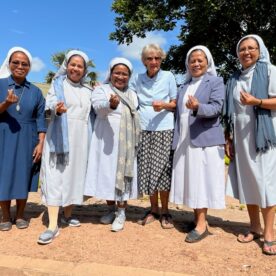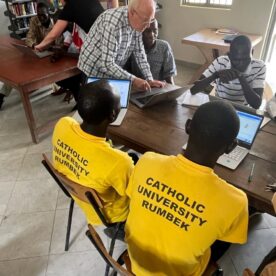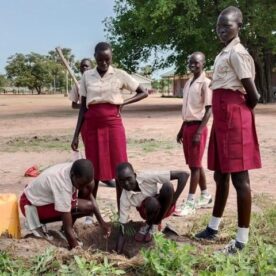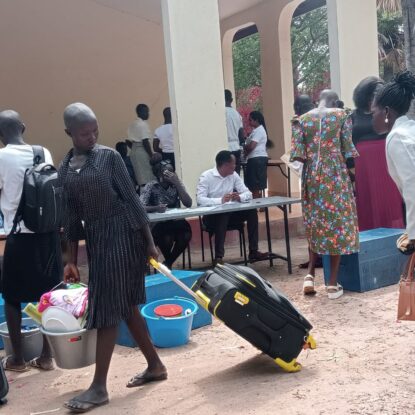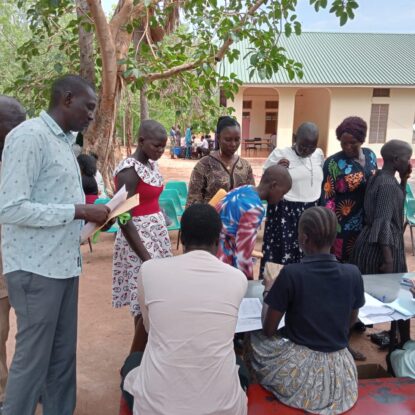Give Peace A Chance – Fr Alan MSC in South Sudan
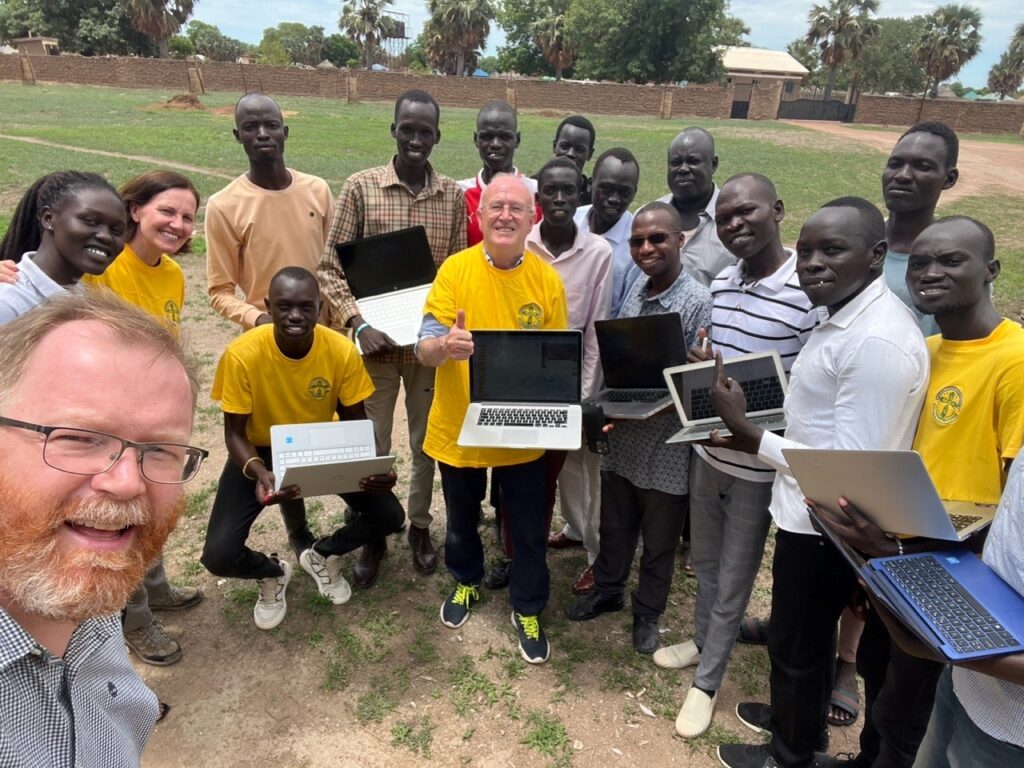
The world of education in Central Africa is small and even after only a short while you can link up with people from all over. With this in mind I Whatsapped a friend who is a religious priest who runs a Catholic university in Khartoum to see how he was doing. In short, not well at all. When he replied he said he had been forced to shutter the university and he is currently in Port Sudan. What state things will be in when he returns remains uncertain. What is certain is that the violence in Sudan has persisted far longer than even the most pessimistic estimations.
It was only last week when one of his students called into our office in the Catholic University of South Sudan, Rumbek. He was hoping to finish his degree in computers here, but the near totally absence of computers, coupled with prohibitively priced internet access, means that it was an impossibility. Still, he is happy to be home with his family safe and sound.
In the midst of the violence to the north, coupled with ongoing tensions in the Tigrayan region of Ethiopia, and following a terrible attack on a school in Uganda that even made the European news, it important to stop and be thankful of the peace that we currently enjoy here in South Sudan. Sure, we have our ups and downs. The University’s entire electricity supply, consisting of four old car batteries and a few solar panels, decided to give up the ghost, so there was a lot of running around to jury rig a solution. Still, in no time at all the printer was working again. No lights, but thankfully the lack of sunshine is rarely a problem here.
In the last few weeks we had loads to do, and the odd power cut aside, it was all good. We had a full week of teacher training for our Loreto Primary School teachers during a midterm break. It included class preparation and management, the history of the Sisters, and the nature of Catholic identity in school (run by myself). As you’d imagine the team of primary teachers are just the best. When you are singing the Gloria during the Mass they are the ones with their hands right up in the air. When you are dealing with over 1,300 boys and girls enthusiasm is a must!
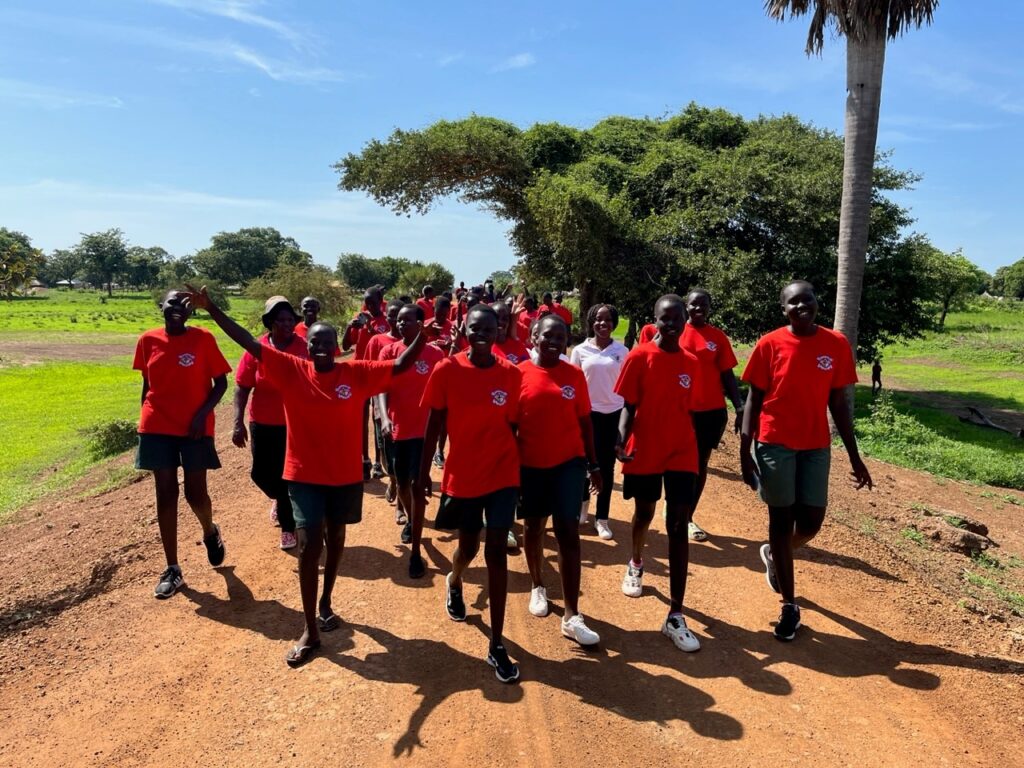
Peace happens quietly. It’s violence that makes most of the noise or at least it does most of the time. The Senior 4 Students (the equivalent of our sixth year class) take part in an annual peace walk. This year we walked the 45km from Loreto to our neighbouring parish of Cueibet. We had an early start, beginning at the school grotto with some prayer and then we hit the road. The girls were delighted to get out and about in the community. The people in turn were happy to meet our students, especially when they found out what they were doing. Not so long ago such a trip would have been impossible, due to the proliferation of small arms, banditry on the roads, and widespread insecurity. That day we made plenty of noise, singing and laughing as we walked, and before you knew it we arrived in Cueibet in time for a simple Mass for peace in South Sudan and a warm welcome from the people of the parish.
Since I wrote last we had two people over from Ireland, Linda Cardiff and Brendan Smith, to work with our University students on computer coding. We have just purchased two laptops, doubling the number of computers on the campus. You’d be amazed how many student you can fit around one screen when you really need to! We also had two new arrivals to the Diocese. The sister congregation of the MSCs, the Daughters of Our Lady of the Sacred Heart, welcomed two new members from Indonesia to their Mapourdit community. One is a trained teacher and the other an excellent nurse. We wish them the very best. Finally, as it is the season for cultivation, our students and teachers were out this week planting trees and weeding their plots of groundnuts, the national staple. Taken individually these are all small things, inconsequential in the eyes of national media its pursuit of the dramatic and the immediate. For the people of Lakes State though, this is significant, as after a long time of insecurity things are slowly building and life is flourishing. Peace is certainly a fragile thing, as evidenced by the world around us, but it is something worth fighting for.
Nhialic ke yin (or God Bless)
Fr. Alan
PLEASE HELP US TO TRANSFORM LIVES IN SOUTH SUDAN
Read more from Fr Alan’s missionary journey in South Sudan:
- Looking for a Sign on the Way to South Sudan
- Building a Better Future in South Sudan
- Christmas Greetings from Fr Alan in South Sudan
- A Cup of Sugar and Maybe a Goat
- Mock Exams and Real Life in South Sudan
- As Easy as Baking a Cake
- Holy Week on the Move
- Three Arrivals and a Party
- Celebrating the Missionary Life
- Seeds of Hope
- Young People Fighting COVID-19 in Rumbek
- Ticket to Ride
- Lions, Snakes, and the World’s Deadliest Predator
- Vaccine Status: Denied
- Christmas in South Sudan
- A Bigger Shovel
- A Week in the Life of Loreto – Bishops, graduations, an ambassador, and the Pope
- Sowing Seeds
- A visit from the MSC Superior General
- Advent
- Do They Know It’s Christmas Time?
- Fr Alan in South Sudan: The Papal Visit
- Life Goes On
Life Goes On – Fr Alan in South Sudan.
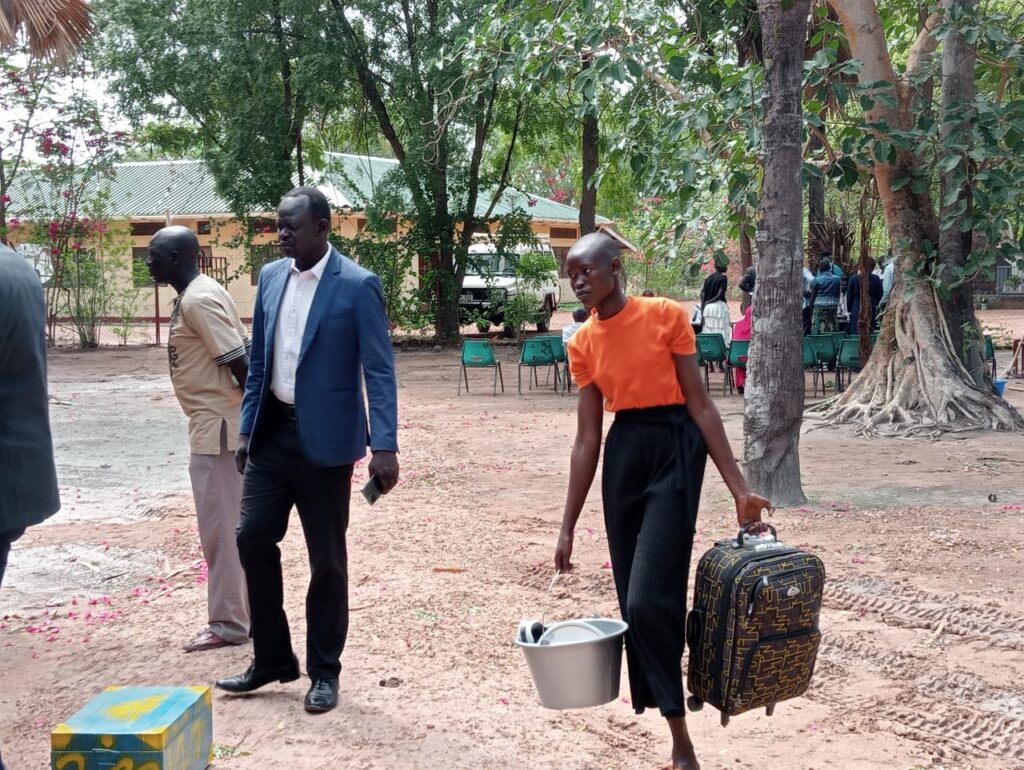
It has been heartening that many people got in touch over the last month to see how things were here, due to the ongoing civil war in Sudan. The situation there is dire, as rival leaders seek to gain as much power and wealth as possible, regardless of the suffering they cause. The only time they think of their people is when they look down to see who they are standing on. The loss of life in the conflict and the subsequent humanitarian crisis have sent shockwaves around an already fragile region.
Tens of thousands of the people now fleeing Sudan into northern South Sudan are themselves South Sudanese refugees who had fled South Sudan in 2013 because of the civil war here. Over the past few weeks they have arrived exhausted, carrying their meagre belonging, and uncertain what will happen next for them or their families. They have come at the worst possible time, as the rains have just started. Flooding usually cuts off the roads around the country, making it far more difficult to transport aid to impacted regions. To complicate matters further, by now people have used up most of their stores from last year’s harvest and it is a waiting game to see how long they can hold on for before they are forced by necessity to harvest what they have just planted. Finally, South Sudan’s largest export is oil from the north of the country, pumped through Sudan to Port Sudan. With the civil war this has all come to a sudden halt. This has fuelled hyperinflation nationally, making basic food and medicine prohibitively expensive in the market. The rains, which are seen as a real blessing, also unfortunately bring with them mosquitos and malaria. A single treatment for a family member can cost almost a month’s wages.
Uncertainty, however, is often the norm here and the South Sudanese are nothing if not resilient. How they manage continues to be something of a mystery to me. They have little alternative though. Within Loreto School and the University things are continuing as normal for the moment. In the school we have just welcomed a whole new group of first years students the Sunday before last. As part of our policy of cooperation and integration, they have come from all over the country, from different backgrounds and ethnic groups. They will be looked after through a fantastic system of school families, where students in second, third, and fourth year will act as their mother, grandmother, and great-grandmothers. Judging by the dancing and singing around the school last Saturday night I think they will be fine.
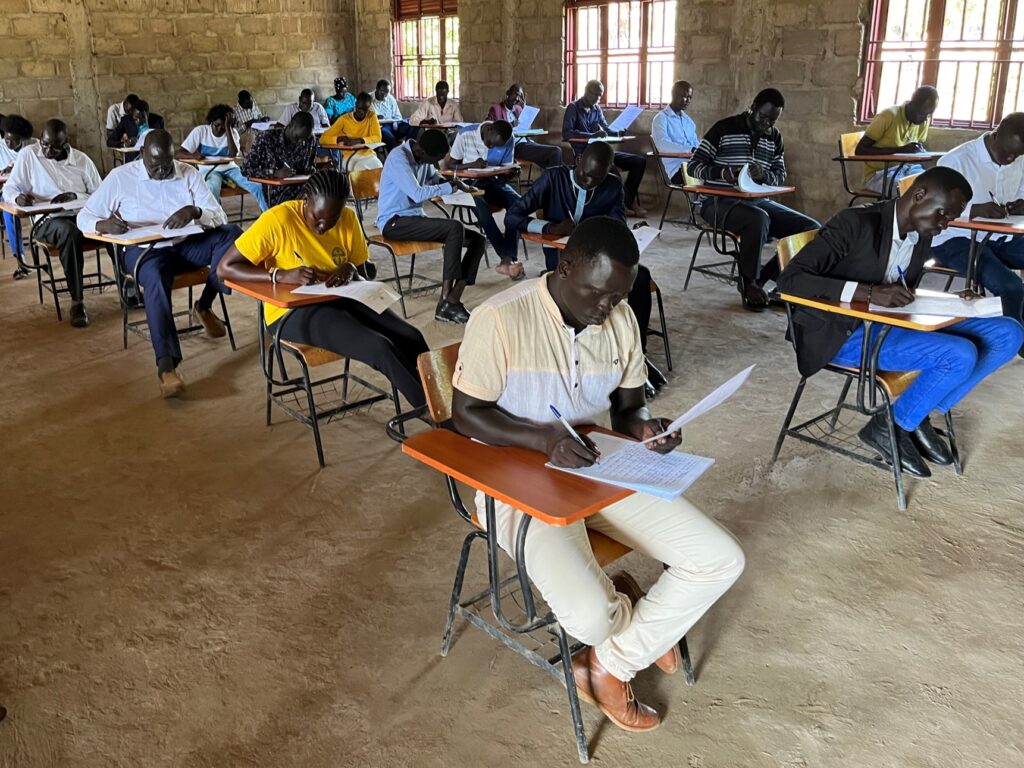
In the University we are coming to the end of our first term and are due to finish exams on Saturday. The number of students enrolled has almost doubled this year and there is already a healthy interest among people hoping to apply for our next academic year. Our focus remains on raising up business leaders, who will build the South Sudanese economy, and training teachers for secondary school. We hope to begin a new Bachelor of Education programme this year in commerce, religious education, and citizenship. In addition, we will continue growing the Catholic ethos aspect of our curriculum, with courses on ethics, theology, and introduction to the Bible as part of our ongoing human formation.
When trying to learn how to play the guitar years and years ago, one of the first songs I practiced was by the Beatles. The lyrics are known by practically everybody and they seem relevant to where I find myself today: Obladi, Oblada, life goes on, brah Lala, how the life goes on. As I said earlier, how things go on here at times, I’ll never understand, but people have no choice, so they just get on with it. Self-pity is a luxury no one can afford. They do the best they can with what they have and they do it better than I ever could. Let’s continue to pray for the situation in Sudan and to pray for each other.
Nhialic ke yin ( God bless),
Fr. Alan.
Read more from Fr Alan’s missionary journey in South Sudan:
- Looking for a Sign on the Way to South Sudan
- Building a Better Future in South Sudan
- Christmas Greetings from Fr Alan in South Sudan
- A Cup of Sugar and Maybe a Goat
- Mock Exams and Real Life in South Sudan
- As Easy as Baking a Cake
- Holy Week on the Move
- Three Arrivals and a Party
- Celebrating the Missionary Life
- Seeds of Hope
- Young People Fighting COVID-19 in Rumbek
- Ticket to Ride
- Lions, Snakes, and the World’s Deadliest Predator
- Vaccine Status: Denied
- Christmas in South Sudan
- A Bigger Shovel
- A Week in the Life of Loreto – Bishops, graduations, an ambassador, and the Pope
- Sowing Seeds
- A visit from the MSC Superior General
- Advent
- Do They Know It’s Christmas Time?
- Fr Alan in South Sudan: The Papal Visit
PLEASE HELP US TO TRANSFORM LIVES IN SOUTH SUDAN
Fr Alan in South Sudan: The Papal Visit
Juba International Airport is chaotic at the best of times. It is only for the hardiest of travellers, with a sense of reckless abandon, and the sturdiest suitcases. On Friday, the 3rd of February, though, it reached new heights. As I flew back into Juba, the Pope was beginning his ecumenical pilgrimage to South Sudan, along with the Archbishop of Canterbury and the Moderator of the Scottish Presbyterian Church just two hours later. The crowds were heaving with singing and dancing, officials were everywhere waving arms and shouting, and (ironically for a peace pilgrimage) there were plenty of military to make sure everything went without a hitch.
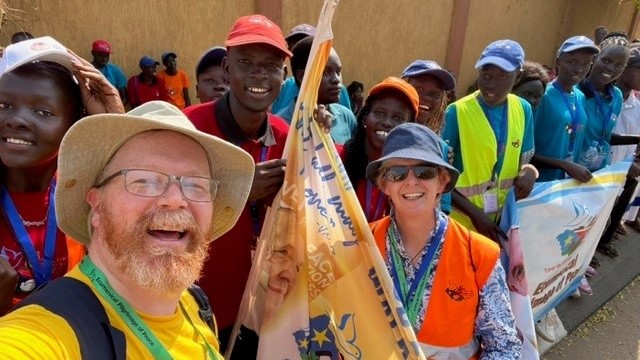
The Vatican, and Pope in particular, have been involved in promoting peace in South Sudan for the last decade. When he met the President and Vice Presidents in Rome in 2019, the Pope stunned those present by getting down on his knees, kissing their feet, and begging that they would work for peace in the world’s newest country. This powerful act of humility demonstrated more beautifully than words ever could how committed he was to building a different future for a people in need of hope.
After dropping off my bags, I joined the group from our Loreto school lining the road to welcome the Pope. If I was tired after my flight, it was nothing in comparison to what they must have been feeling. Over the previous nine days, they had walked as part of a pilgrimage of peace from our school in Rumbek to Juba. A group of ninety students, interns, Religious, and youth walked from village to village on the way to the capital, witnessing to peace. Each evening they performed a play in the marketplace on the theme reconciliation and nonviolence.
“Brothers and sisters, it is time for peace!”
With all the police cars racing up and down the official route, we almost missed the Pope as he drove from the airport in his usual understated Fiat. He was to spend the first day meeting with the President, politicians, and the diplomatic corps. His message was encouraging, but given that twenty-seven people were killed the day before in a vicious revenge attack just three hours outside of Juba, uncompromising:
“Years of war and conflict seem never to end and recently, even yesterday, there have been bitter clashes. At the same time, the process of reconciliation seems stagnant and the promise of peace unfulfilled. May this protracted suffering not be in vain; may the patience and the sacrifices of the South Sudanese, this young, humble and courageous people, challenge everyone and, like the seeds sown in the soil that give life to plants, allow peace to blossom and bear fruit. Brothers and sisters, it is time for peace!”
The following morning the Pope met with priests and religious working around the country in the Cathedral. He remembered those sisters and priests who had been murdered in recent years, but also offered words of encouragement. Immediately afterwards, our youth who had walked from Rumbek had an opportunity to meet the Pope and have their photo taken with him on the steps of the Cathedral. He had heard their story and wanted to meet them personally. To say that they were on cloud nine afterwards would be an understatement. It would be something that they would never forget.
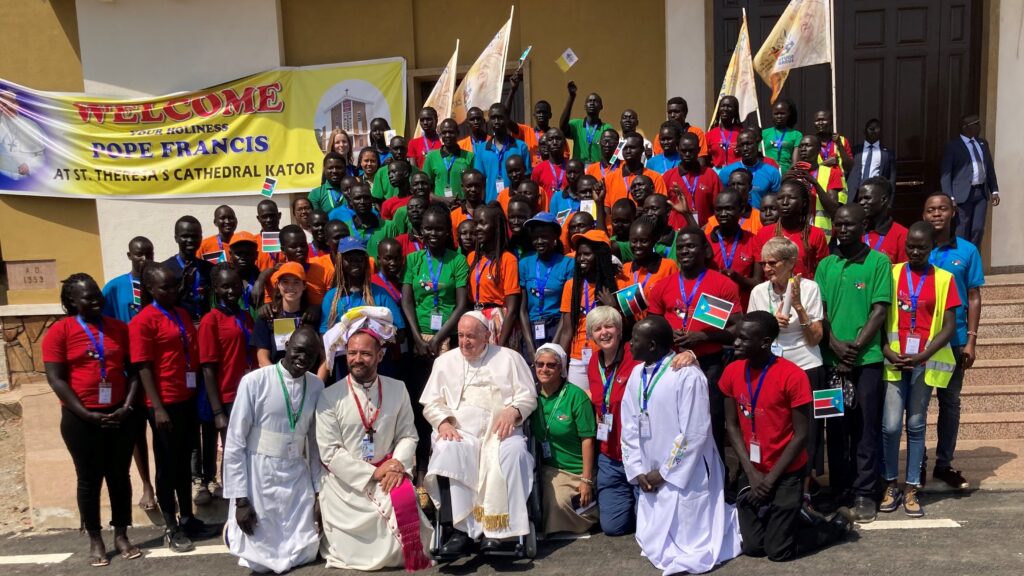
Later that day, the Pope met with internally displaced South Sudanese living around Juba, only a small group of over 2,000,000 people who have had to leave their homes due to flooding or fighting. Many have been living in camps for so long returning will be next to impossible. Mapourdit, where the Daughters of Our Lady of the Sacred Heart minister, was a refugee camp before Independence, but has not become a permanent settlement. Pope Francis agreed with many of the local leaders that this cannot be the way.
“Only with peace, stability and justice can there be development and social reintegration. There is no room for further delay: great numbers of children born in recent years have known only the reality of camps for displaced persons. They have no memory of what it means to have a home; they are losing their connection with their native land, their roots and their traditions. The future cannot lie in refugee camps.”
On Saturday evening the Pope joined Archbishop Welby, the Rev Iain Greenshields, and church leaders from around South Sudan to pray for peace. In particular, they identified the problem of violence against women as a pervasive reality and spoke of the role women have played and will play as peacemakers, justice seekers, and future leaders. The response of the people there was joyous, even if many had to wait hours in 40C heat just to witness it.
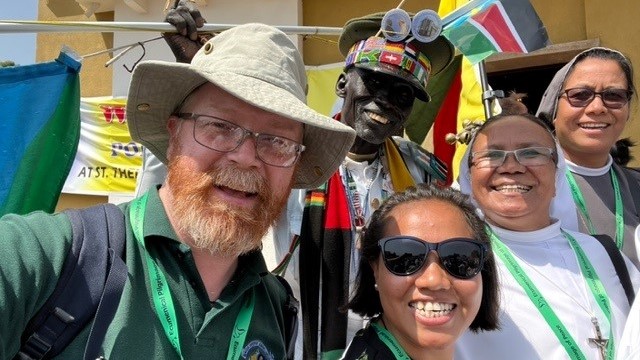
Finally, on Sunday, we celebrated Mass with the Pope in the John Garang Memorial Park. It was a capacity congregation, and if you weren’t there by 4:00am, you weren’t getting a seat. When the Pope drove around the site at the beginning giving his blessing, he was greeted by cheers and ululations. In his homily, he spoke of St Josephine Bakhita, one of the patron saints of the country, and her fight from slavery to freedom, overcoming some of the worst challenges imaginable. Instead of becoming embittered by her struggle, she used it to inspire her and those around her to witness to her faith.
“Hope is the word I would leave with each of you, as a gift to share, a seed to bear fruit. As Saint Josephine reminds us, women, especially here, are a sign of hope, and in a special way I thank and bless all the women of the country.”
As the Pope started his journey back to Rome, we hopped onto the bus and joined our rag-tag collection of cars on the drive back to Rumbek. Only last year, this journey would not have been possible due to insecurity, but things are more settled now – hopefully a sign of things to come. Fourteen hours, one flat bus tire, and one broken down car later, we arrived back in Loreto Rumbek. An amazing journey for all of us, but for South Sudan one that is continuing.
Nhialic ke yin,
Fr Alan
Read more from Fr Alan’s missionary journey in South Sudan:
- Looking for a Sign on the Way to South Sudan
- Building a Better Future in South Sudan
- Christmas Greetings from Fr Alan in South Sudan
- A Cup of Sugar and Maybe a Goat
- Mock Exams and Real Life in South Sudan
- As Easy as Baking a Cake
- Holy Week on the Move
- Three Arrivals and a Party
- Celebrating the Missionary Life
- Seeds of Hope
- Young People Fighting COVID-19 in Rumbek
- Ticket to Ride
- Lions, Snakes, and the World’s Deadliest Predator
- Vaccine Status: Denied
- Christmas in South Sudan
- A Bigger Shovel
- A Week in the Life of Loreto – Bishops, graduations, an ambassador, and the Pope
- Sowing Seeds
- A visit from the MSC Superior General
- Advent
- Do They Know It’s Christmas Time?
PLEASE HELP US TO TRANSFORM LIVES IN SOUTH SUDAN
Fr Alan in South Sudan: Do they know it’s Christmas time?
“Growing up in Ireland, it was impossible to get through December without hearing Do They Know It’s Christmas? repeatedly. Like crackers with bad jokes, or recipes that try (in vain) to make brussels sprouts tasty, the song was an essential and important part of festive season. It electrified people and called them to act in solidarity with the people of East Africa who were suffering from famine in 1984. As I wandered around the Loreto convent in Rumbek almost forty years later, I could hear it again – repeatedly. One of the sisters in the community is a keen Christmas music aficionada – and when I say keen, I mean really keen!
The run up to Christmas in Rumbek has certainly been busy. We finished up work in the Catholic University on the 16th, concluding the first half of our bridging course with our new students. Due to conflicts that eventually led to South Sudanese Independence and the civil war of 2013, levels of education remain stubbornly low. Consequently, everyone beginning our degree programmes must undertake six weeks of intensive maths and English to prepare them for third level studies. We are hoping to welcome almost forty new students who are planning to study a degree in either business administration or English and English literature. We have a record number of women joining our courses, which is a real gift. They benefit from a scholarship programme supported by the Mission Support Centre that reduces their fees and supports their studies. In our small way, we are looking to redress the gender imbalance in education that excludes that vast majority of women.
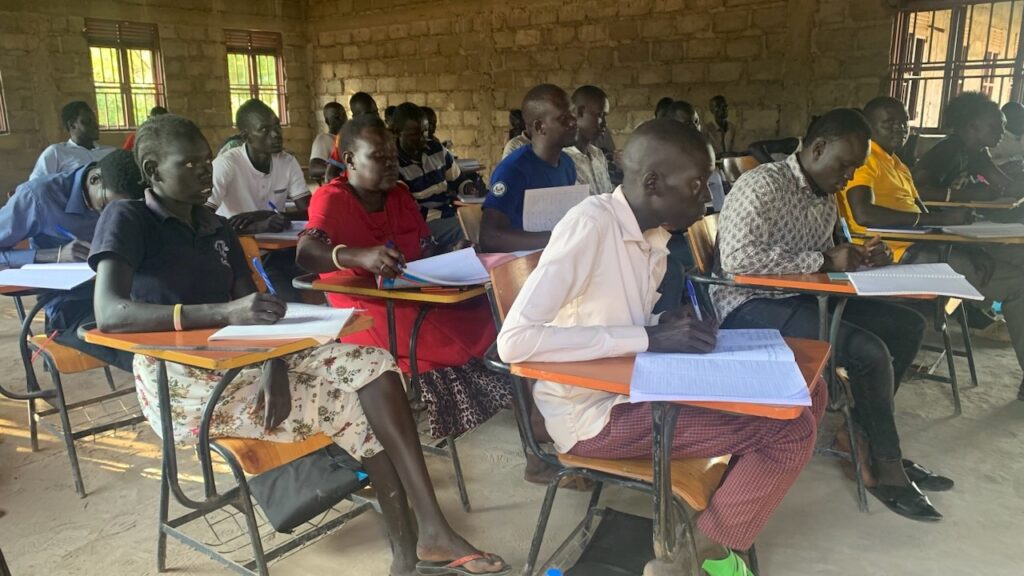
This last year has been one of the most peaceful in Lakes State, but it does not happen by chance. Initiatives on many levels in both Church and state work to create a safer, more secure environment. Just before Christmas, Sr Orla planned a peace walk with the young women from the Loreto internship programme. Over twenty of us began before dawn and walked towards Cueibet, a parish some 50km away. We got most of the way there, before the temperatures went up to the high thirties. Part of the reason for the walk was to model how young women from different ethnic groups all around the country journeyed together in solidarity and encouraged people they met, especially young girls, to pursue a brighter future.
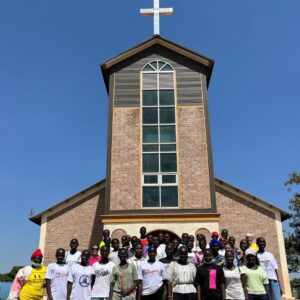
We all went to a local parish where I was celebrating Mass for Christmas Eve. It was to begin at 8:30pm, but, based on my experience from being there last year, I settled on a wall outside and welcomed people as they gradually arrived. In no time at all, the church was packed to the rafters, and we all welcomed the birth of Jesus with joy and song. Previously, it would not have been possible to have so many people out that late at night, but now the streets were busy with groups of people on their way to their churches. They absolutely know it’s Christmas time.
For Christmas Day, the girls who stayed with us for the holidays cooked the food, while I was off for another Mass. Each year a group remain in the school, either because they live far away from Rumbek or they cannot go home due to a forced marriage issue. Either way, we all sat down to a lunch of pork, sakumawiki (like cabbage, but not really), tamalaka (a peanut and greens like sauce), paper food (not sure how to describe that one), and Irish potatoes (which are just potatoes, but in the market that’s what they are called). We were joined by our Bishop and some guests, including boys from the La Salle school who also couldn’t make it home. The day ended with Sr Orla introducing the girls to Monopoly, which in retrospect, based on years of inevitable conflict in Irish homes, was not the best idea. Still, good fun was had by all, even if the Bishop’s team cheated.
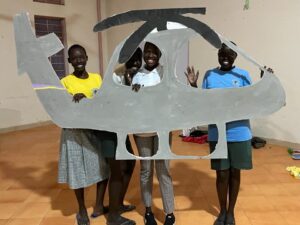
So, we are looking forward to the New Year with a sense of anticipation. The new library renovation for the University supported by the MSC benefactors will be completed in January. I won’t have to worry about the bat droppings landing on my desk anymore through a ceiling that looks like Swiss cheese, and the students will have a place to study and do group work. The Pope is planning to come to South Sudan in February as part of an ecumenical peace initiative. The Loreto team and students will lead an eight-day walking pilgrimage to Juba for the event. It should be a wonderful occasion. Please do keep us in our prayers, as you are most assuredly in ours.”
Wishing you and your families every blessing for 2023,
Fr Alan
Read more from Fr Alan’s missionary journey in South Sudan:
- Looking for a Sign on the Way to South Sudan
- Building a Better Future in South Sudan
- Christmas Greetings from Fr Alan in South Sudan
- A Cup of Sugar and Maybe a Goat
- Mock Exams and Real Life in South Sudan
- As Easy as Baking a Cake
- Holy Week on the Move
- Three Arrivals and a Party
- Celebrating the Missionary Life
- Seeds of Hope
- Young People Fighting COVID-19 in Rumbek
- Ticket to Ride
- Lions, Snakes, and the World’s Deadliest Predator
- Vaccine Status: Denied
- Christmas in South Sudan
- A Bigger Shovel
- A Week in the Life of Loreto – Bishops, graduations, an ambassador, and the Pope
- Sowing Seeds
- A visit from the MSC Superior General
- Advent
PLEASE HELP US TO TRANSFORM LIVES IN SOUTH SUDAN
Fr Alan in South Sudan: Advent
It’s Advent in South Sudan, which means that everybody is busy with endings and beginnings. It is a beautiful time here right now, as the rains ended in October and the land is still green. We have been enjoying a time of relative security for the last few months, which has allowed us to harvest the groundnut crop in peace.
This week in Loreto Secondary School is taken up with the end of term exams, so all of students are diligently going over their class notes, working in study groups, and preparing as best they can. I usually go for a walk around 6:00am, as the sun comes up and before the heat of the day sets in. Already, there are students sitting under trees or in classrooms getting ready. However, this is nothing unusual. It happens right throughout the year. The girls know that education is their best way of ensuring they and their family have a better future. School is serious business.
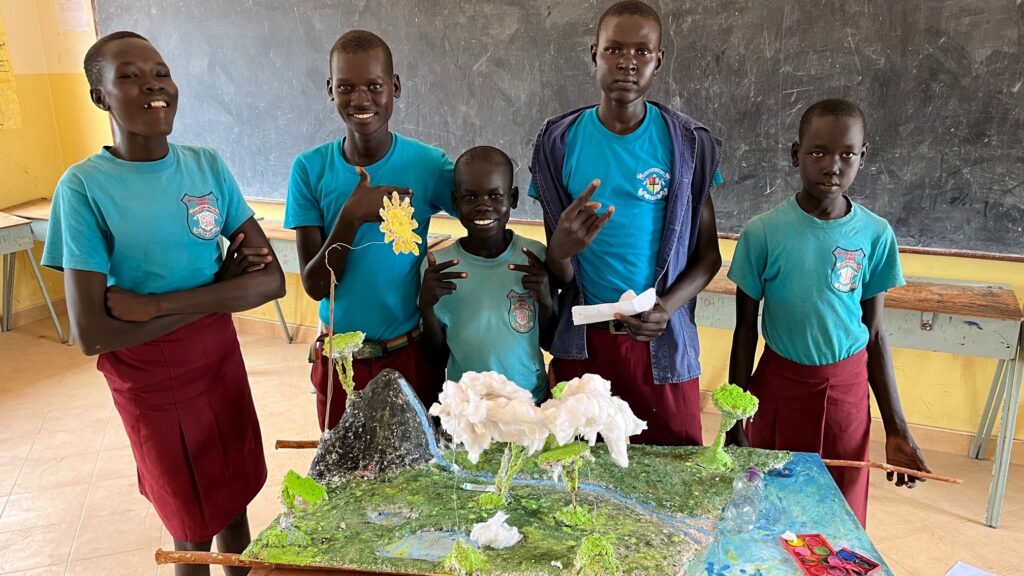
It’s not so serious though that they can’t take time to have fun or get involved in important extracurricular activities. Last Friday, a group participated in a local government project around the rights of women. On Saturday, our Peace Club staged a roadside play in the local village. Before a group of the chiefs, families, and school children, they debuted their new drama on the need for peace in South Sudan. There was also poetry, traditional dance, some speeches, and plenty of laughter. It was the first time that they, as a group of young women, addressed the chiefs about their hopes for the future. The Benydit, or head chief, was delighted with the work and encouraged them to continue.
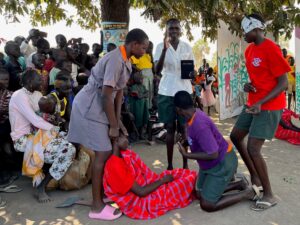
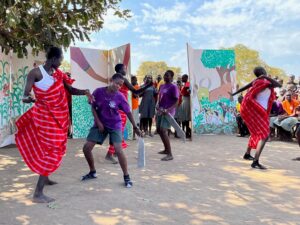
In the Primary School the kids have been busy too. Last week, we had a fancy dress competition, where kids created wonderful papier mâché lions and cows, along with weather conditions, mathematical symbols and shapes, fruits and vegetables, and traditional costumes. On Thursday, the focus was on arts and crafts, again related to their studies. They drew pictures of insects for biology, model villages and farms for citizenship, and the water cycle for general science. Everything was made from scrap paper and reused cardboard. Their creativity was extraordinary.
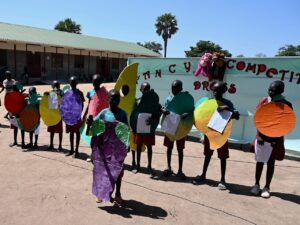
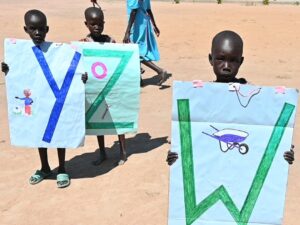
While things are winding down for Christmas in the schools, we are only getting started in the Rumbek Campus of the Catholic University of South Sudan. We have had a new intake of students for our degree programmes in English and English literature and in business administration. Right now, they are taking part in an intensive six-week course in English and maths to improve their basic standard and prepare them to begin their classes at the end of January.
It is an exciting time, because it is hoped that from this group we will have a new generation of well-trained secondary school teachers and business leaders. We are carrying on with our partial scholarship for women to encourage greater participation. We already have quite a few enrolled and a number of these are mothers who are returning to education, something that rarely happens here.
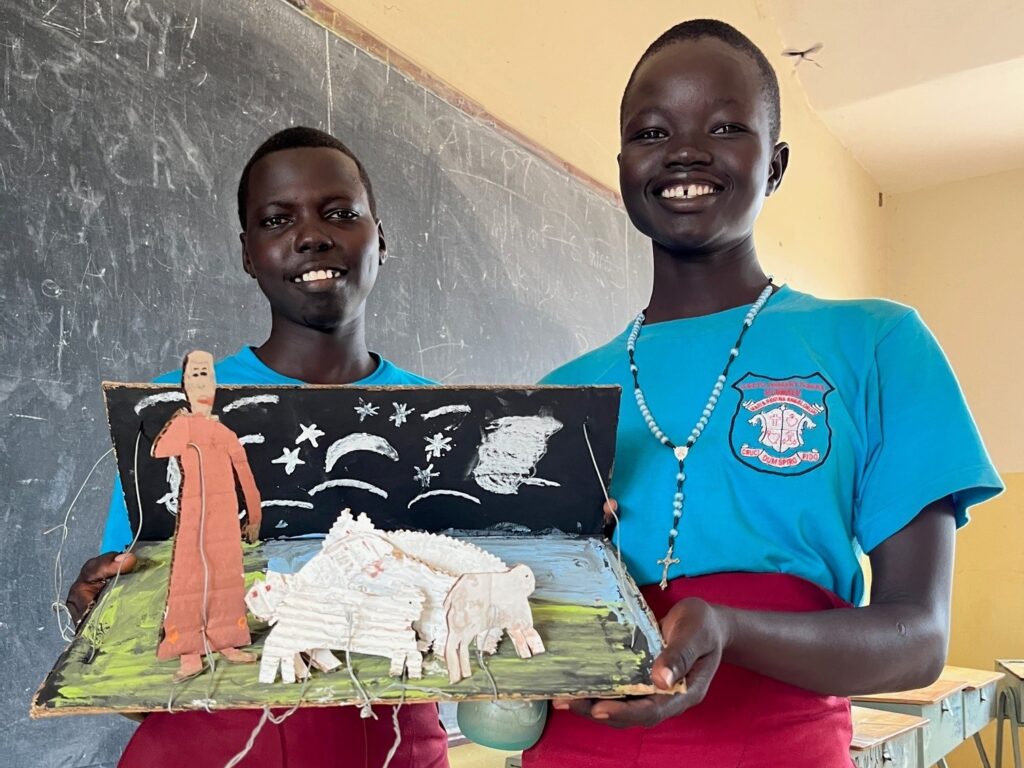
In addition, we are refurbishing our library and student centre. Previously, the building we used was dilapidated and bats were in the process of eating through the ceiling. The entire power supply came from an old solar unit and a couple of second-hand car batteries. The floor was cracked and pockmarked, although potholed might be a better description. As I write, the builders are putting in a new ceiling. Once that is finished, they will plaster the walls properly and we have sourced a durable, but inexpensive, tile for the floor.
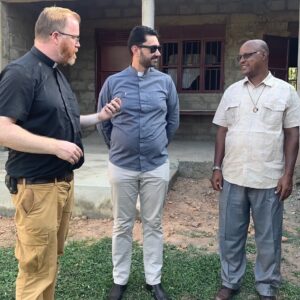
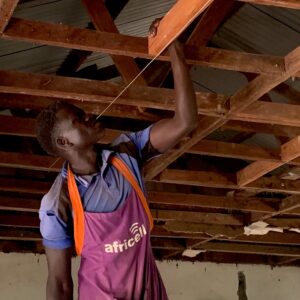
Some may argue whether this is the most urgent need. However, education is the essential foundation of a country that, if done properly, will ensure development that is sustainable for everyone. It is about giving someone a rod, instead of offering them fish year after year. Our students make real sacrifices to be here, whether they are in primary, secondary, or third level, but with their energy, vision, and commitment the future is bright indeed.
Ben Nhialic areer kek a yin,
Fr Alan
Read more from Fr Alan’s missionary journey in South Sudan:
- Looking for a Sign on the Way to South Sudan
- Building a Better Future in South Sudan
- Christmas Greetings from Fr Alan in South Sudan
- A Cup of Sugar and Maybe a Goat
- Mock Exams and Real Life in South Sudan
- As Easy as Baking a Cake
- Holy Week on the Move
- Three Arrivals and a Party
- Celebrating the Missionary Life
- Seeds of Hope
- Young People Fighting COVID-19 in Rumbek
- Ticket to Ride
- Lions, Snakes, and the World’s Deadliest Predator
- Vaccine Status: Denied
- Christmas in South Sudan
- A Bigger Shovel
- A Week in the Life of Loreto – Bishops, graduations, an ambassador, and the Pope
- Sowing Seeds
- A visit from the MSC Superior General
PLEASE HELP US TO TRANSFORM LIVES IN SOUTH SUDAN
Fr Alan in South Sudan: A visit from the MSC Superior General
Soon after arriving in South Sudan in November 2020 for my current appointment, I received a WhatsApp message from Fr Abzalón, the Superior General of the Missionaries of the Sacred Heart, wishing me the best with the new mission and saying that he would like to visit one day. In the height of the pandemic, travelling anywhere seemed unlikely, and the possibility of coming to Rumbek would test even the most credulous of believers.
Less than two years later, though, I was in Juba to welcome him early on a Wednesday morning. When I first arrived in 2017 on a research trip, the airport was a simple tent, with no chairs that worked, and a length of runway. Now we have graduated to a building with one carousel, a sort of Central African Knock International Airport if you will. After a brief prayer to St Jude, he successfully negotiated the labyrinthine entry visa process, and we were off.
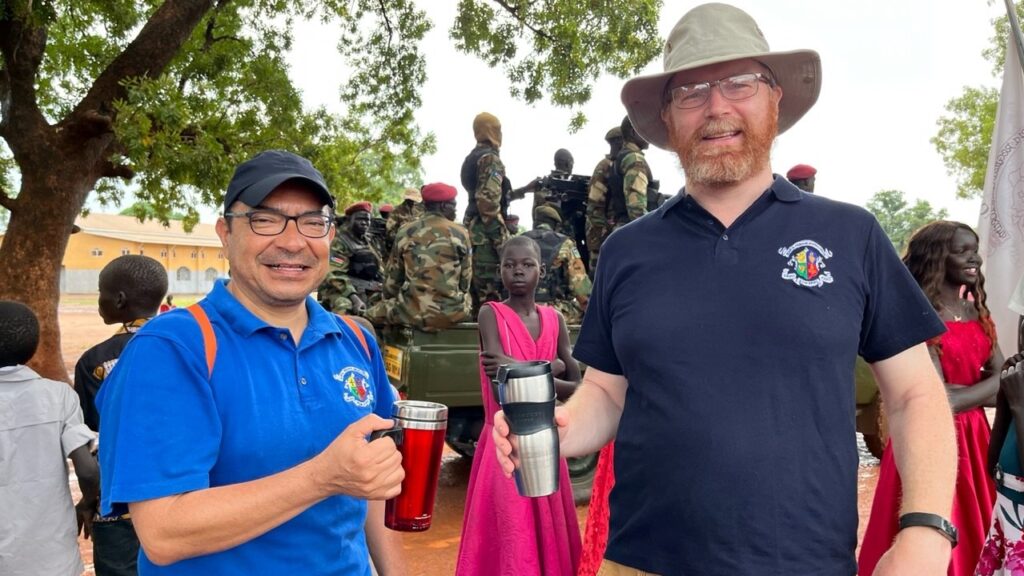
Challenges and resilience
Part of the Superior General’s mission was to see what was happening in Diocese of Rumbek and to explore if there was a need for a greater MSC presence. To that end, we spent our first day meeting with the head of religious missionaries in the country and then the coordinator of the Jesuit Refugee Service (both coincidentally Irish) to get the lay of the land and a sense of the reality of the people. That evening, we had dinner with Christian Carlassare, the newly ordained Bishop of the Diocese of Rumbek. He returned to the country just last March to be ordained, following an attempt on his life in 2021. Over cremated nyama choma (a speciality of grilled meat), the Bishop told him of the many challenges the Diocese faced, but also about the resilience of the people who persevered through a long fight for Independence and the Civil War of 2013.
Before sunrise, we were back to the airport for our flight to Lakes State. The closest approximation to the domestic departures experience is if you imagine the chaos in Dublin Airport earlier this year, then squeeze it all into one-tenth of the space, occasionally switch off the power, raise the temperature about 20C, and then you’re about half-way there. However, our guardian angels were working time and a half, and by 8:10am we had arrived in Rumbek and were heading to Loreto, which would be Fr Abzalón’s base for the week.
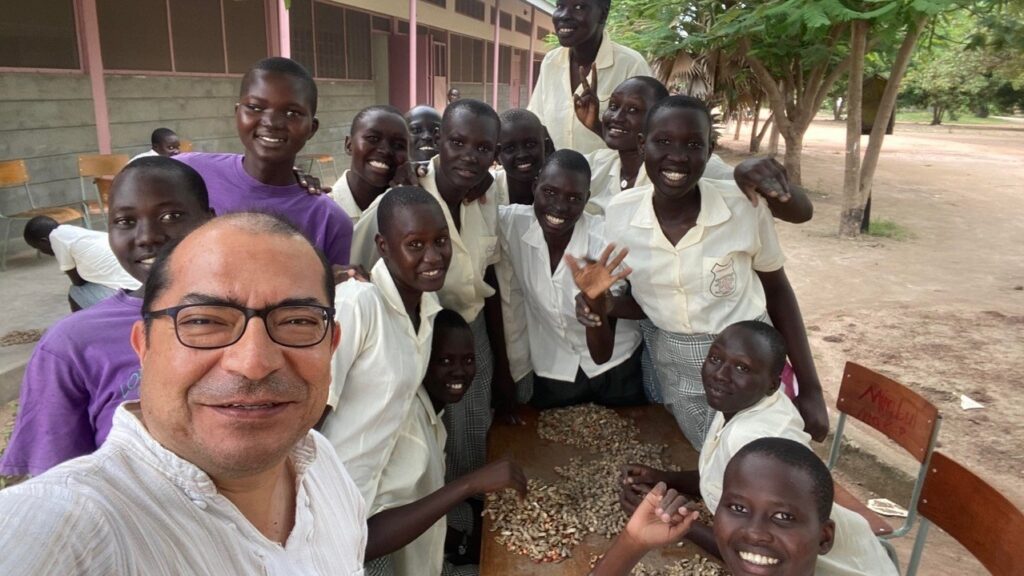
Exploring Loreto and beyond
Fr Abzalón had the opportunity to explore the Loreto compound, beginning with the Mary Ward Primary Health Care Clinic. In addition to looking after all the students and staff, it has responsibility for nine local villages encompassing 27,000 people. Most come for vaccinations, nutritional support, and especially malaria treatment. In the primary school, there are 1,400 day pupils, with a further 340 boarding girls in the secondary school. We are coming to the end of the first semester, so everyone was intent on their revision for exams. That afternoon he came to the Catholic University of South Sudan, Rumbek, where I work as principal. There, he met the young men and women who are training to be the teachers and the business people of the future.
It’s hard to believe in recent years that to drive into the east of Rumbek would mean that you were taking your life in your hands. It would be highway robbery, except there was no highway and if you got away with just being robbed you would be doing well. With the arrival of the new governor last year there have been far fewer problems. On Friday, we joined the final-year students and some of the staff to be part in a peace walk to the Parish of the Good Shepherd in Thonaduiel. We started off like good pilgrims at dawn and arrived eight hours later and 45km away, finishing with a short time of prayer. It was a witness for the villages we walked through of the country that could be built together if peace were to flourish.
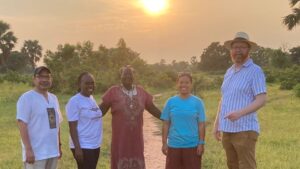
South Sudan celebrated its Independence on the 9th of July 2011, and every year since then it has been a day for processions, speeches, and sports in Freedom Square. They have an understandable sense of pride over the establishment of their nation, but are conscious too of the outstanding issues that remain, most notably peace building, the rights of women, and the first elections that are due to take place next year. The Loreto students were out in force for the day and their marching was featured on national TV, to the great excitement of all the girls.
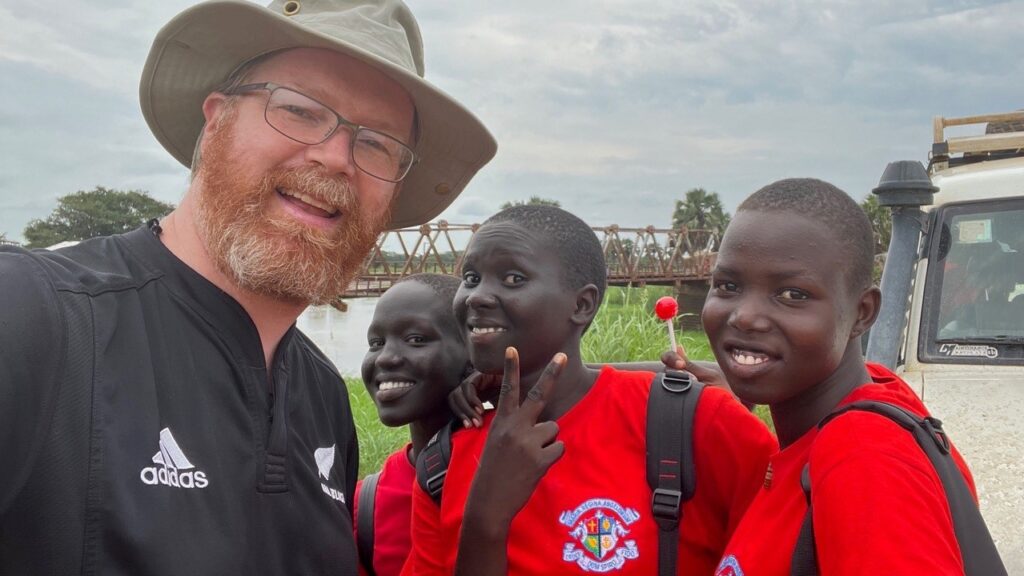
Pioneering work
The next few days allowed Fr Abzalón the chance to visit some of the local villages in Maker Kuei, where we are based. People live in simple conditions with a quiet dignity and have a genuine warmth for visitors. He took a cooking class to learn how to make combo (a type of stew containing vegetables, peanuts, and meat) over a charcoal fire. He also attended some of my CRE classes in the secondary school and shared what life is like in Guatemala, his home country. It was a special blessing to have him celebrate our Sunday Mass for the students outdoors under the shade of the neem trees.
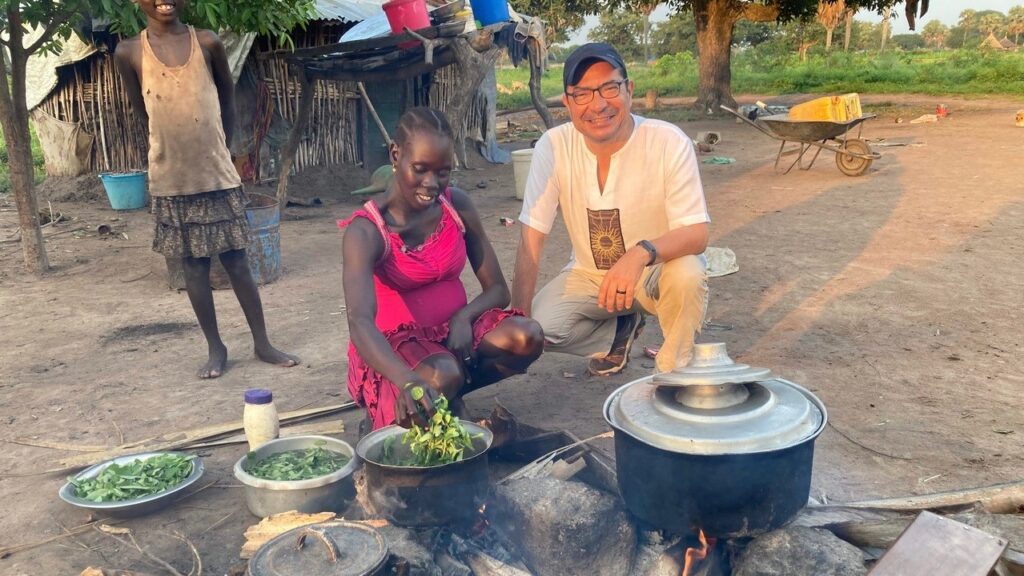
As his week came to a close, Fr Abzalón still had a lot to see. On Tuesday, we went to visit the Daughters of Our Lady of the Sacred Heart in Mapourdit. The Daughters are the trailblazers of the Chevalier Family in South Sudan. They have been here for over twenty-five years and they endured many hardships before the country won Independence. Today, they continue their pioneering work in education and healthcare under the most challenging of conditions.
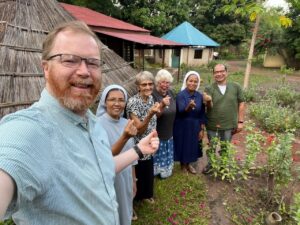
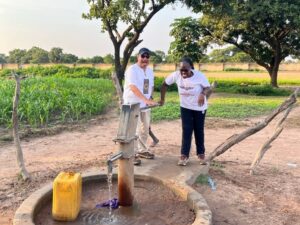
Thursday came around quicker than anticipated and Fr Abzalón headed back to Juba to get a COVID test and an onward flight to Rome. Looking back on his experiences he wrote to us that same week:
“The mission … is a wonderful and prophetic project of education and integral promotion, especially of young women. The community there struggle day by day to build and transform this challenging and complex, but at the same time, beautiful reality. The Chevalier Family is present in South Sudan.”
– Fr Abzalón Alvarado Tovar MSC
Superior General of the Missionaries of the Sacred Heart
Ben Nhialic areer kek a yin,
Fr Alan
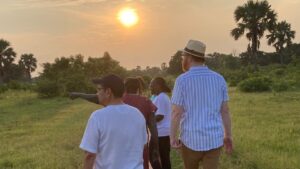
Read more from Fr Alan’s missionary journey in South Sudan:
- Looking for a Sign on the Way to South Sudan
- Building a Better Future in South Sudan
- Christmas Greetings from Fr Alan in South Sudan
- A Cup of Sugar and Maybe a Goat
- Mock Exams and Real Life in South Sudan
- As Easy as Baking a Cake
- Holy Week on the Move
- Three Arrivals and a Party
- Celebrating the Missionary Life
- Seeds of Hope
- Young People Fighting COVID-19 in Rumbek
- Ticket to Ride
- Lions, Snakes, and the World’s Deadliest Predator
- Vaccine Status: Denied
- Christmas in South Sudan
- A Bigger Shovel
- A Week in the Life of Loreto – Bishops, graduations, an ambassador, and the Pope
- Sowing Seeds
PLEASE HELP US TO TRANSFORM LIVES IN SOUTH SUDAN
Fr Alan in South Sudan: Sowing Seeds
“It’s time to sow seeds in South Sudan. The rains have finally arrived and the whole school is out in the afternoons cultivating. There is a celebratory feel to the whole affair, or at least there would be for me if it wasn’t so hot and humid. The students of Loreto Rumbek are utterly undeterred by such trivial matters like working in an environment where you could fry an egg on a stone. No matter the weather, they are out with their jembes (a sort of bent shovel that everyone uses here) and watering cans, tilling, weeding, and tending their crops. In a matter of weeks, land that had previously looked totally dry and lifeless will be green and thriving, with plants growing taller than me. Just this evening on a walk around the campus, a couple of them were sitting in their plot, tired but justifiably proud of their work.
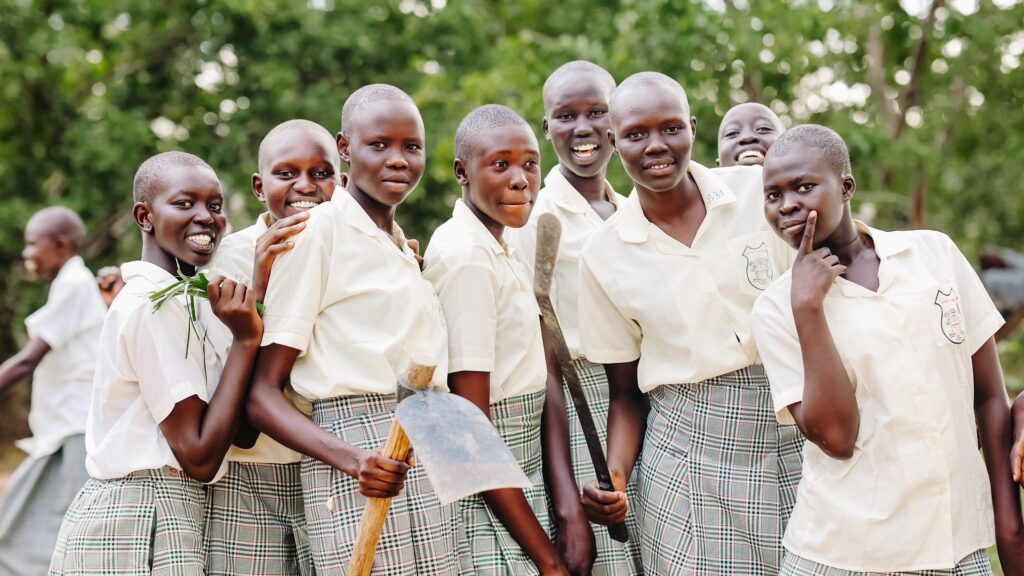
Food insecurity is a constant threat, and many people are just one bad rainy season away from serious malnutrition. The governor of the state has designated Friday as a day for cultivation and has mandated that all public offices are closed to facilitate the work. In the Catholic University where I am now working in the afternoons, lecturers will take advantage of the three-week break in between semesters to go back to their villages to farm their land. Farming here is more than a serious business; it is a way of life.”
“[We are sowing] a seed that will flourish in a future yet to come. That will be a harvest worth waiting for.”
“This time of year is the most challenging. By now, many families will have used their last food stores and it is a delicate balancing act deciding how long to wait before harvesting. The longer they wait, the greater the amount of food grown, but sometimes time is a luxury that families cannot afford. It is a situation that is very much part of the Irish story. While we are now a prosperous, developed country, with a thriving, modern agricultural sector, we have inherited memories of what it was like not to have enough to eat and to be forced to leave our country or starve. They are so powerful that they continue to shape our identity even today.
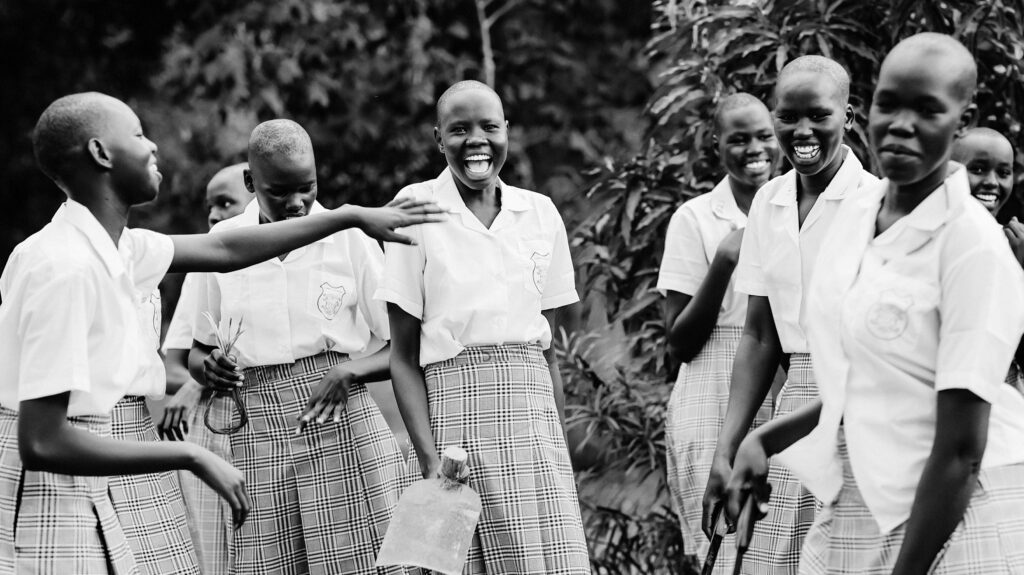
It’s not all work though in Loreto. Three afternoons a week, the students have sports, and they approach them with their typical boundless enthusiasm. By the time I venture out around 5:00pm, the temperature has dropped to a more reasonable 36C. While I wouldn’t manage five minutes (a wildly optimistic estimate) running up and down the pitch, the girls have already been busy for an hour playing volleyball, basketball, and soccer. We are in the process of setting up netball and already there is a growing list of names who want to sign up.
One of the first albums I ever bought myself was by a Cork band called The Sultans of Ping FC. Aside from having an off-beat, energetic sound, they espoused a philosophy of world peace through football. That’s a lesson we’re happy to practice here. Sports are about more than exercise and fun. They teach our young people the value of fair play, teamwork, and determination. Our school has adopted a policy for many years of including people from different ethnic groups to help promote unity and peace. A game of volleyball with students from all around South Sudan may not seem like much in the grander scheme of things, but it sows a seed that will flourish in a future yet to come. That will be a harvest worth waiting for.”
Ben Nhialic areer kek a yin,
Fr Alan

Read more from Fr Alan’s missionary journey in South Sudan:
- Looking for a Sign on the Way to South Sudan
- Building a Better Future in South Sudan
- Christmas Greetings from Fr Alan in South Sudan
- A Cup of Sugar and Maybe a Goat
- Mock Exams and Real Life in South Sudan
- As Easy as Baking a Cake
- Holy Week on the Move
- Three Arrivals and a Party
- Celebrating the Missionary Life
- Seeds of Hope
- Young People Fighting COVID-19 in Rumbek
- Ticket to Ride
- Lions, Snakes, and the World’s Deadliest Predator
- Vaccine Status: Denied
- Christmas in South Sudan
- A Bigger Shovel
- A Week in the Life of Loreto – Bishops, graduations, an ambassador, and the Pope
PLEASE HELP US TO TRANSFORM LIVES IN SOUTH SUDAN
Cakes, plants, and alpacas: A wonderful fundraiser at the Sacred Heart Church
Sincere thanks to all who took part in our recent fundraising event for the children of the Holy Family Care Centre, a care facility run by the Daughters of Our Lady of the Sacred Heart, with the support of the MSC, in Ofcolaco, South Africa. The fundraising event took place at the Sacred Heart Church on the Western Road, Cork, across the last weekend of May, and raised a running total of €5,200 for the Holy Family community, with donations still coming in.
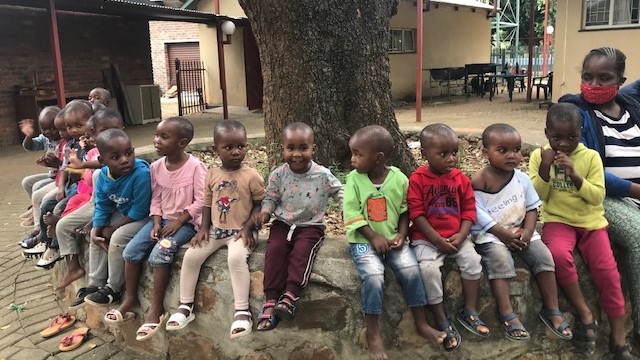
The plant and cake sale took place during the weekend Masses, where local treats such as home-made brown bread and fresh free-range eggs were also on sale. Teas and coffees were available for all to enjoy while they browsed, while John and Richie kept the atmosphere light and lively with marvellous music on the accordion and mandolin.
A group of five alpacas took a star turn over the weekend, as Pat and Nora Casey from Macroom were kind enough to bring them along to take part in our fundraiser. “A few of alpacas were due a grooming session,” reported Fr John Fitzgerald, our MSC Missions Office Director. “Luckily, Fr John Finn was at hand with his farming skills to shape their fringes and add to their overall good looks.”
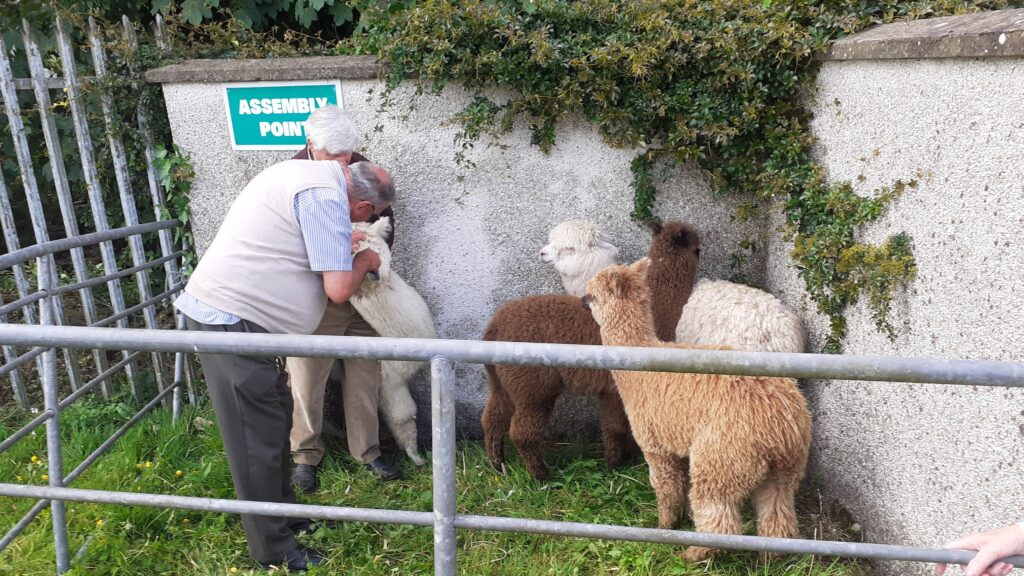
Founded in 2002, the Holy Family Care Centre in South Africa has been run by the Daughters of Our Lady of the Sacred Heart with the support of the MSC for 20 years, under the leadership of Sr Sally Duigan FDNSC. The Holy Family Care Centre is an invaluable facility for young children who are very ill and who, in many cases, have been orphaned or abandoned. These children are primarily HIV positive and are in need of specialised care. With the resources to accommodate 70 children, the Centre’s facilities are stretched to full capacity and beyond on a daily basis; Sr Sally admits that the team at the Centre does its best never to turn a child away, and the Sisters there sometimes find themselves with 80 children in their care.
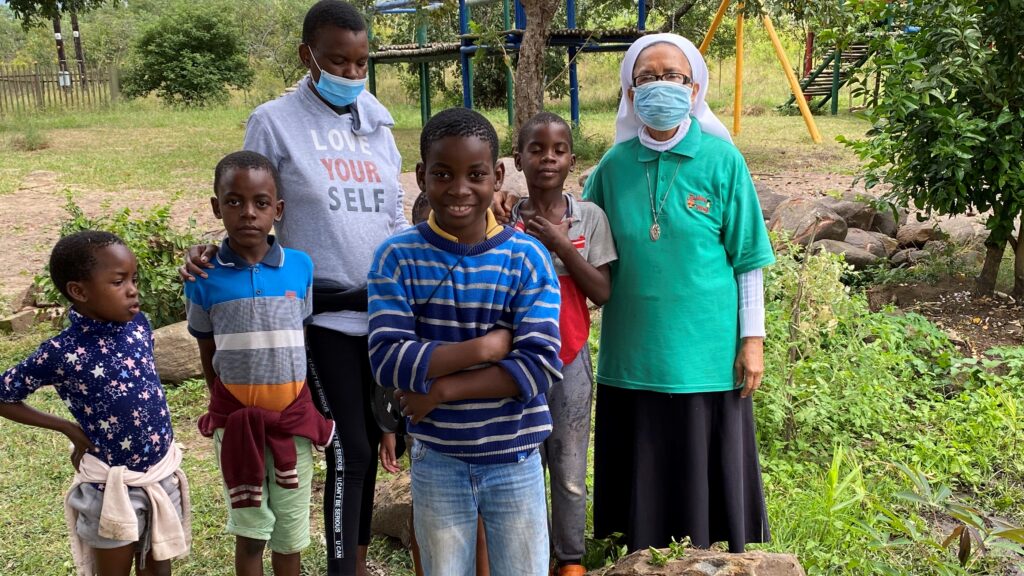
“The reasons for admission to the Holy Family Centre vary, but many children have been abandoned, sexually abused, physically abused, orphaned, or made vulnerable because of HIV/AIDS,” says Sr Sally. “Some come from horrific backgrounds and arrive here very ill, malnourished, frightened, lacking social skills, and generally very bewildered.”
The Holy Family Care Centre is, above all, a place of family, unity, and love. “We love these children unconditionally,” says Sr Sally. “It doesn’t take long for them to feel at home and to change once they feel loved and cared for.”
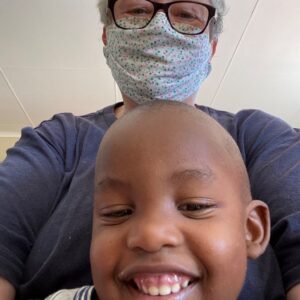
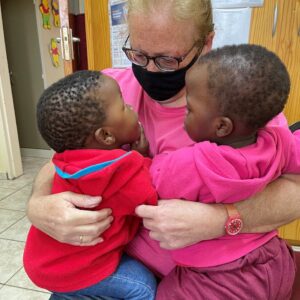
A sanctuary for children in need, the team at the Holy Family Care Centre care for the children on a 24/7 basis, and the Centre feels more like a home to one big happy family. The availability of funding is an ongoing concern, as the Centre relies on donations and the generosity of MSC mission friends and the local community for the upkeep of buildings and equipment, and to be able to continue doing the work that they do – “[giving] our children love, security, and care, in the hope they will thrive,” in the words of Sr Sally.
“Since our parishioners here in Cork cannot visit Holy Family, or help them directly, the plant and cake sale is a wonderful way of supporting Sr Sally and her team in keeping the Centre going, without having to worry about the immediate future,” said Fr John. “In addition, it was great fun for all involved!”
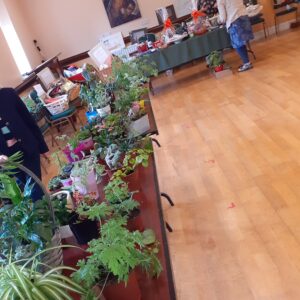
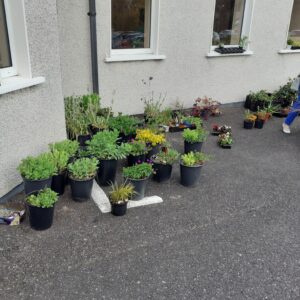
IF YOU CAN, PLEASE SUPPORT THE HOLY FAMILY COMMUNITY
Fr Alan in South Sudan: A Week in the Life of Loreto – Bishops, graduations, an ambassador, and the Pope.
“It has been a busy week. There are rarely quiet weeks in Loreto, but this last one has certainly kept us all on our toes. Thankfully it has all been positive, and in light of the challenges we see on the news now, we are especially grateful.
Last Monday the Irish Ambassador to Ethiopia, Djibouti and South Sudan, Nicola Brennan, visited the school with a member of her team. Their arrival meant a 50% increase in the number of Irish people in Lakes State. It was only for a day, but in that short time they saw all of the exciting ministry that Irish missionaries are involved in, including the schools, the Primary Health Care Clinic, the Catholic University, outreach to people living with leprosy, and the local parish run by the Spiritans. It is the same anywhere around the world. The Irish are a small group, but we punch well above our weight.
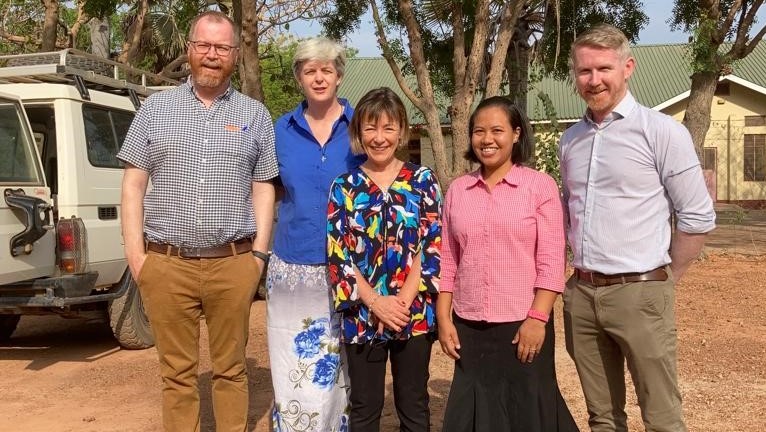
Ash Wednesday brought not just the beginning of the Lenten season, but also the news we had been waiting nearly a year for, the date for the consecration of Bishop-elect Christian Carlassare. Fr. Christian was shot several times last April in a home invasion in the Holy Family Cathedral. After a period of convalescence, he is ready to return and will be consecrated on the Feast of the Annunciation, March 25th.
With just over three weeks’ preparation time, everyone has leapt into action. We are expecting anywhere between 5,000 and 7,000 people to attend from all over the Diocese and South Sudan. Some will even come from as far away as Italy, the Bishop-elect’s home country. It will be a wonderful, grace-filled, joyous, prayerful, and chaotic day. His return will mark a new chapter for the Church here that will seek to address the desire for vision, reconciliation, and evangelisation.
“The challenges we face are formidable.”
Last, but by no means least, on Friday we had the graduation of our Senior 4 students. They will soon finish in Loreto altogether and sit their final national exams. Many hope to go on to university and study law, teaching, journalism, healthcare, business, IT, and a host of other subjects.
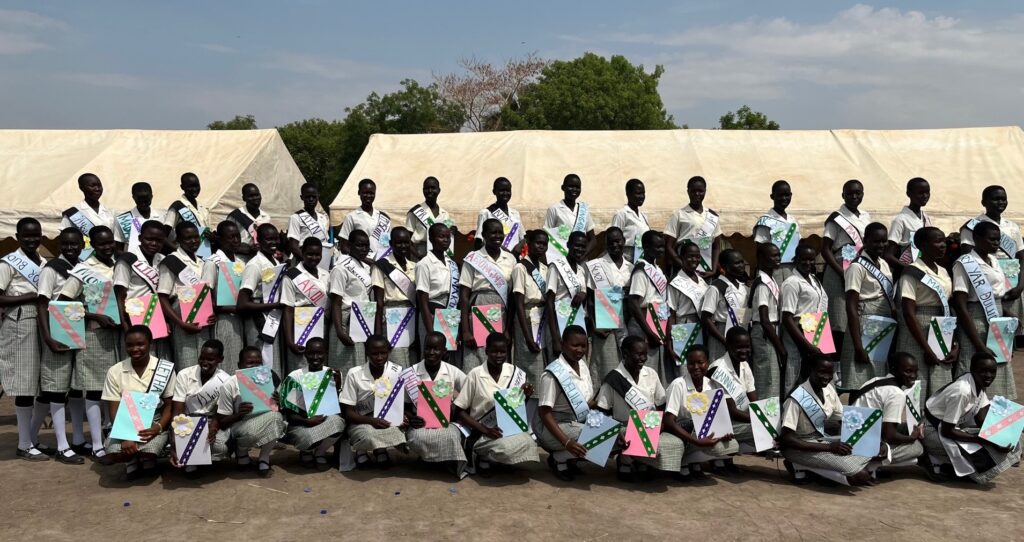
On the day the students were joined by 1,000 family members and friends who celebrated the day with them. While this ceremony is similar to many taking place around the world about now, here it is remarkable. These young women have had to fight against almost insurmountable odds to stay in school. When they began four years ago in Senior 1, there were ninety of them. This year’s graduating class was comprised of fifty-two students. Many were taken out of school for forced early marriage, and, despite the very best efforts of the team here, did not return. It is important to note that when it comes to retention of students and completion of studies Loreto ranks among the very best in the country, but the challenges we face are formidable.
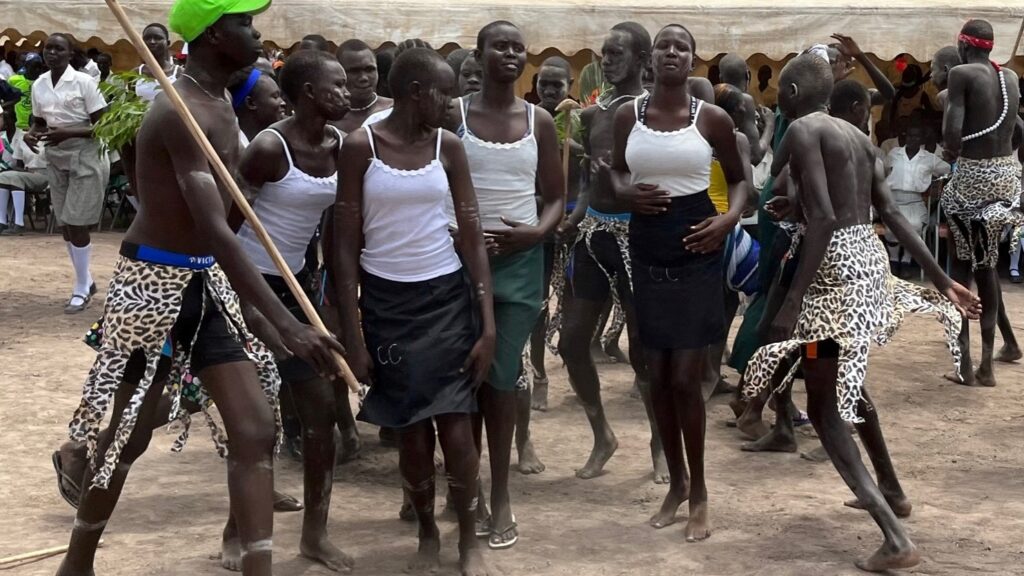
During their graduation, the girls spoke of their own hopes and dreams for the future. Their time in Loreto has helped them to reach a standard that will give them a say in their future that many young women here will be denied. After the Graduation Mass, the morning programme of speeches was interspersed with cultural dances and songs. Parents’ representatives spoke of their pride in their daughters and their belief that these will be the future economic, social, and political leaders of South Sudan. The day was also a good opportunity to showcase the work of the school with the visiting political dignitaries and bring them on board with the work we do.
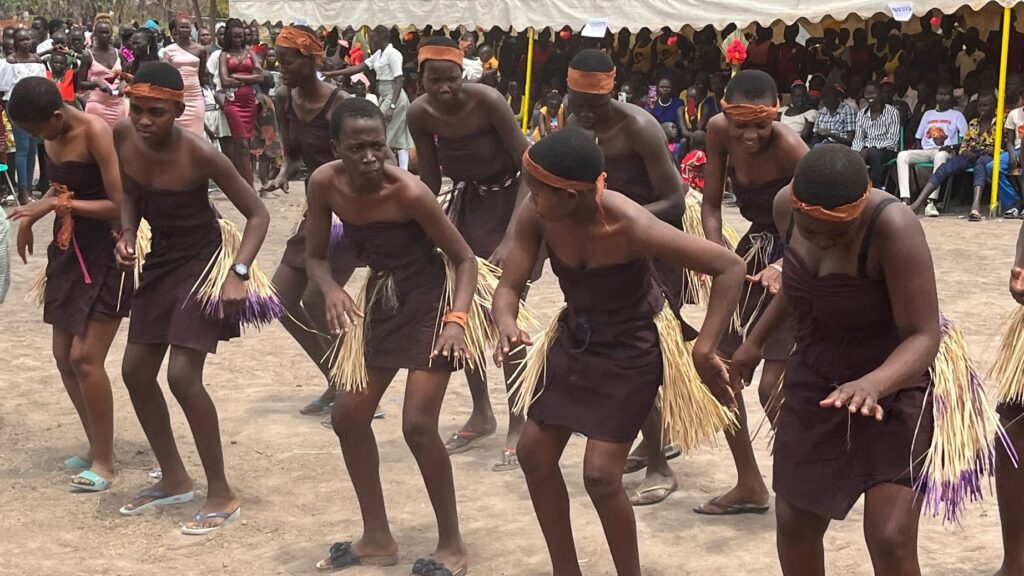
Now that the week is over, another one has begun and it looks to be exciting as well. Please keep our preparations for the Bishop-elect’s consecration in your prayers. I’ll keep you updated on the coming and going. Thank you for all the support that you have given to our ministry here. During the week the MSC Missions Office transferred money that was given for our work in South Sudan. It is just enough to complete a new project for a toilet block, replacing outdated pit latrines. Little by little we are improving every day.
Ben Nhialic areer kek a yin,
Fr Alan
P.S. Almost forgot. We also got news that Pope Francis is coming to South Sudan in July. We are already planning our walking pilgrimage to meet him in Juba. It’s only 427km!”
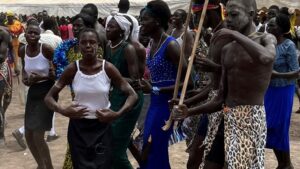
Read more from Fr Alan’s missionary journey in South Sudan:
- Looking for a Sign on the Way to South Sudan
- Building a Better Future in South Sudan
- Christmas Greetings from Fr Alan in South Sudan
- A Cup of Sugar and Maybe a Goat
- Mock Exams and Real Life in South Sudan
- As Easy as Baking a Cake
- Holy Week on the Move
- Three Arrivals and a Party
- Celebrating the Missionary Life
- Seeds of Hope
- Young People Fighting COVID-19 in Rumbek
- Ticket to Ride
- Lions, Snakes, and the World’s Deadliest Predator
- Vaccine Status: Denied
- Christmas in South Sudan
- A Bigger Shovel
PLEASE HELP US TO TRANSFORM LIVES IN SOUTH SUDAN
Fr Alan in South Sudan: A Bigger Shovel
It is an Irish truism that if you dig a good ditch, you don’t get time off, you get a bigger shovel. Apparently this is not just Irish wisdom, but South Sudanese as well. In addition to the work in Loreto College, I have been drafted by the Diocese of Rumbek to help run the local Catholic University. At this point of life you’d imagine I’d have learned to keep my head down.
It may sound a grand affair, but it is certainly a lot more simple than you’d imagine. We have a roof, but no ceiling; windows, but no glass; and floor with no tiles. The less said about the two pit toilets that serve the campus the better. Just today we had the cleaner in to take care of the bat infestation in the library, that also serves as the office. Having droppings continually fall on the desk during an academic meeting is distracting to say the least.
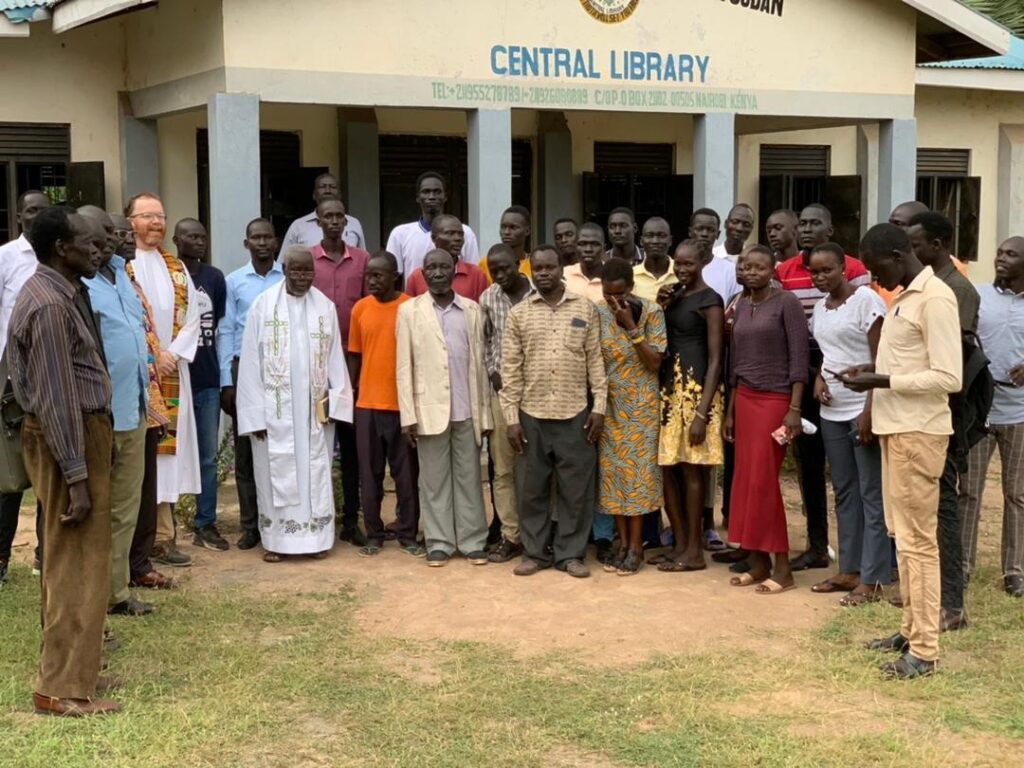
“Group photo from the My First Mass at the University showing the library with all the bats right behind!”
Initially I took on the role with the expectation that it would be a short term appointment. In fact, early on there was even a discussion around closing the University altogether. Still, it is one thing to consider in a meeting room, surrounded by pages of accounts, and entirely another to act out once you have met our students.
At the moment we have a sum total of 59 women and men studying either business administration or teaching with a focus on English literature.They are almost all from Rumbek, with only a couple from further afield. Some have come straight from school, while others are looking for new opportunities later in life. All are committed and enthusiastic about their third level studies. It is something to see really.
It takes a lot of energy to get worked up about a computer class, without computers, but with a drawing of a Windows home page on a blackboard.
This was one of the first classes I visited when I began. Since that experience of ‘theoretical computing’ we have been able to set up a relationship with a Jesuit community not so far away that runs a computer course – with actual computers!
We are also seeing an exciting new development. In traditional culture here, once a woman has her first baby she leaves formal education to focus full time on child rearing and subsistence farming. However, so far I have met a number of young mothers who are coming back to study, with their new born under their arm. It is unprecedented and we are looking at ways of supporting them and their young families. I mentioned the idea of a creche, but so far I’ve been met with looks of incomprehension. Honestly, if it wasn’t for the initiative of a particularly creative Donegal MSC setting up a parent and toddler group in one of my old parishes I wouldn’t have a clue either. We’re working on it. Watch this space.
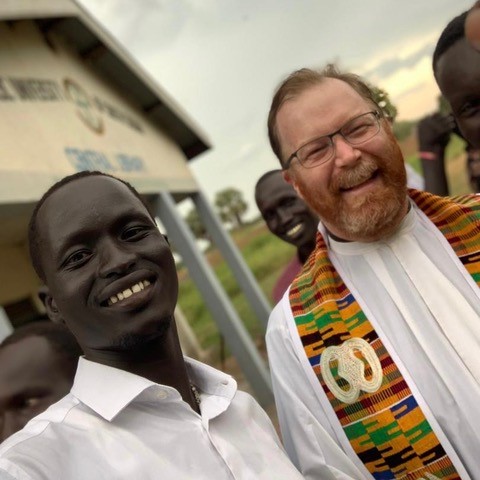
“My first Mass at the University.”
For me the main reason the University is so important is that we are the newest country in the world and we really need to develop the local economy. It has to be stimulated by well trained, committed teachers and hardworking, innovative business people. Charity is excellent for crisis situations. It’s an act of solidarity and compassion for someone you will never meet, but who you are ready to call brother or sister. However, charity is not a long term strategy and instead we need to increasingly invest in people on the ground to effect their own change, not just raising up themselves and their families, but entire communities as well.
The motto our small University is, The Truth Shall Set You Free. Our faith underlies everything we do here. Religious sisters, brothers, and priests are among the best educated in the area and they are working as lecturers in ethics, management, business, and education. We have great local educationalists who are taking the lead too. I spoke with one them today, as we were cleaning up the last of the bat droppings from the top of my desk, that in five years we’ll look back and have a good laugh at everything we went through to become a real third level college. In the meantime there is a lot of work to do. I’d better get my shovel.
Bi Nhialic arrer kek yin,
Fr Alan
Read more from Fr Alan’s missionary journey in South Sudan:
- Looking for a Sign on the Way to South Sudan
- Building a Better Future in South Sudan
- Christmas Greetings from Fr Alan in South Sudan
- A Cup of Sugar and Maybe a Goat
- Mock Exams and Real Life in South Sudan
- As Easy as Baking a Cake
- Holy Week on the Move
- Three Arrivals and a Party
- Celebrating the Missionary Life
- Seeds of Hope
- Young People Fighting COVID-19 in Rumbek
- Ticket to Ride
- Lions, Snakes, and the World’s Deadliest Predator
- Vaccine Status: Denied
- Christmas in South Sudan
PLEASE HELP US TO TRANSFORM LIVES IN SOUTH SUDAN
MSC World Projects Appeal 2022: OLSH Global Outreach
The Daughters of Our Lady of the Sacred Heart (OLSH) are a vital part of our Sacred Heart Family,
working all over the world, often in partnership with MSCs, under our shared motto:
“May the Sacred Heart of Jesus be everywhere loved.”
OLSH MINISTRY IN BRAZIL
There are currently 30 Sisters living in a house for aging members of the OLSH community in Vila Formosa, São Paulo. Several of these Sisters need special care, and Sisters in Vila Formosa are raising funds to purchase 3 bath chairs, 2 hospital beds, 2 hospital chairs, a digital pressure device, and 10 sets of linen for the hospital beds.
€2,600 will provide enormous comfort for aging OLSH Sisters who are in ill health.
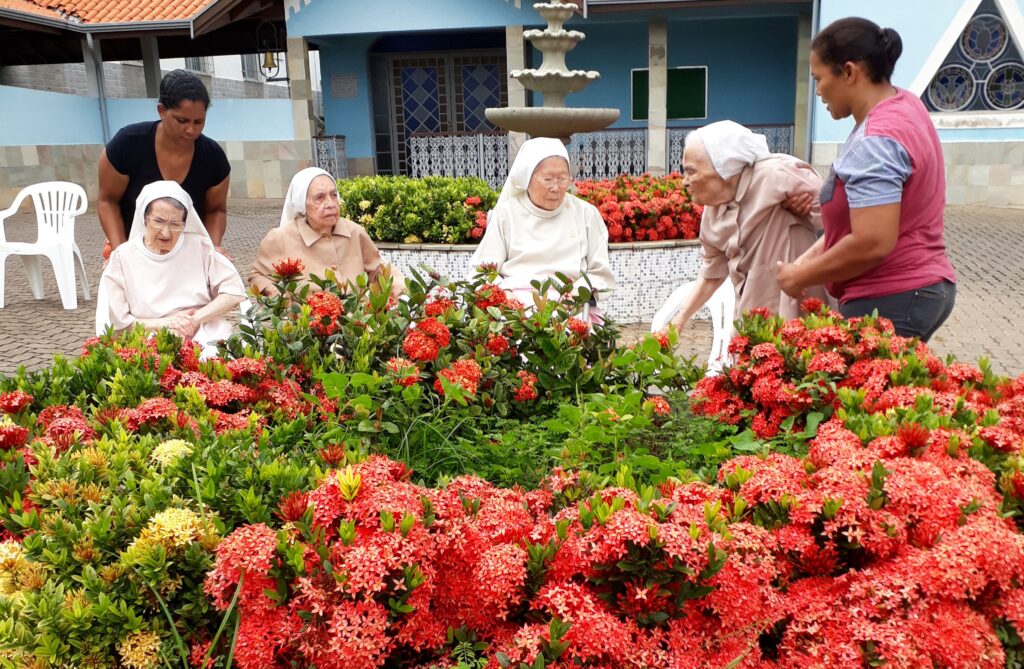
OLSH Sisters in Alfenas run a second-hand clothing shop, where money raised from sales is used to buy food supplies for poor families in the area.
Every month, OLSH Sisters in Alfenas distribute 65 food parcels to families in real need. The Sisters are currently renovating the shop to make it more practical and attractive, for the dual purposes of encouraging donations, and also to make the shopping experience a more pleasant one for those in need, who go to this shop to cater for their own needs.
The Sisters need €2,000 to continue the necessary renovations,
and €400 for washing powder to launder the clothes for resale.
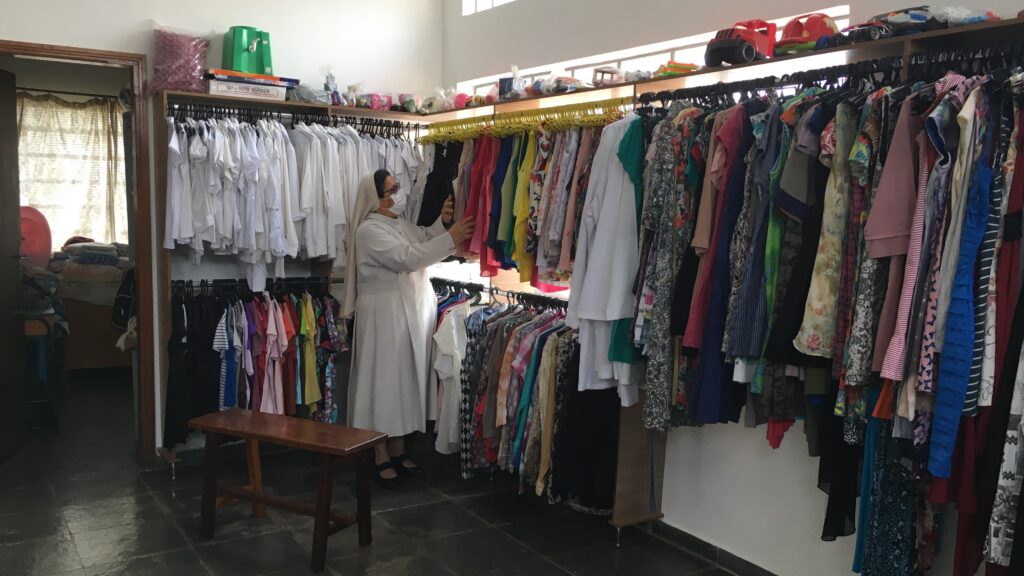
OLSH Sisters in Marahao are asking for your help in buying essential liturgical items for Mass, such as missals, chalices, and lectionaries, for several of the 18 mission stations they cover in remote locations across northern Brazil.
€2,300 will provide liturgical items for families in remote communities
to continue to celebrate Mass together.
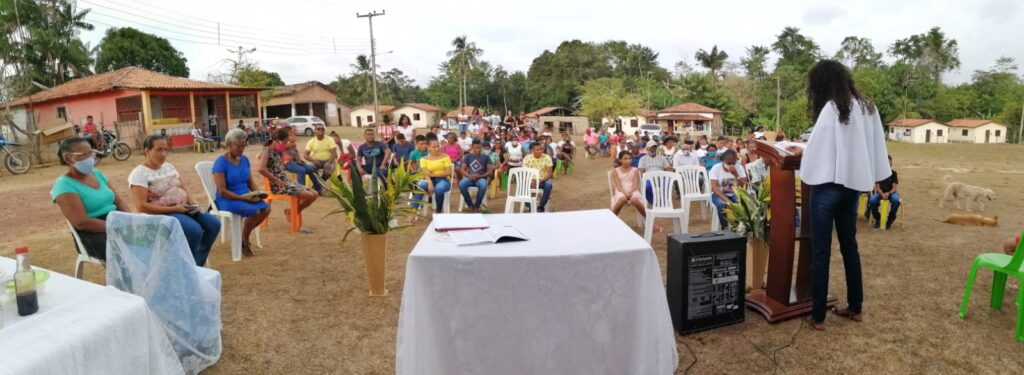
The Daughters of the Lady of the Sacred Heart in São Paulo run a social centre which facilitates a number of workshops, including English lessons, yoga, and crafts for the aged. In addition, the elderly are taught how to comfortably use computers and smartphones.
The centre is currently using 15 old computers, 12 of which are in serious need of repair. The Sisters are working to raise funds to bring their computers back to working order, and continue to provide a comfortable, pleasant space for local people to learn valuable skills and share friendships.
€7,500 will repair the computers, allowing the Sisters to continue
to provide a space for people to meet, to learn, and to share.
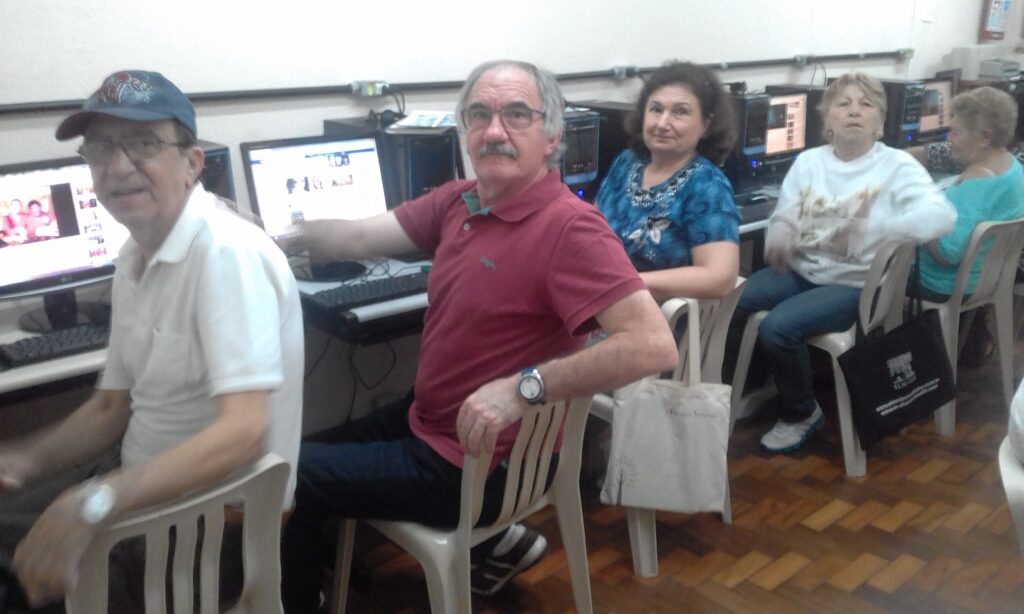
HEALTH CARE IN MAKA KAHONE, SENEGAL
The OLSH Sisters in Maka Kahone, Senegal, run a health centre named for MSC founder Fr Jules Chevalier. Caring for the medical needs of families and vulnerable individuals who are living in conditions of severe poverty and hardship, the Sisters experience serious and concerning issues with security. The threat of violence and theft is an extremely worrying one, and the OLSH Sisters in Maka Kahone are appealing for funds to erect a security fence at the medical centre, along with metal grilles on the windows.
€9,200 will give the Sisters the opportunity to minister to their patients safely,
providing patients with peace of mind to recover.
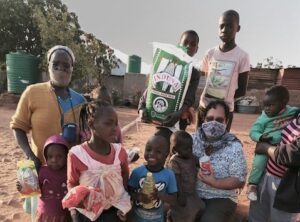
PLEASE SUPPORT OUR OLSH SISTERS IN THEIR GLOBAL OUTREACH
EMPOWERING YOUTHS IN INDONESIA
OLSH Sisters in Indonesia are appealing for help in running an Empowerment and Basic Leadership Training Youth Programme in Central Java.
The programme will provide leadership training for young people, giving the youths involved a wonderful skill set to use as they embark into the world of work, along with the confidence to implement it.
€4,000 will pay for four retreats, an LCD projector, a guitar, a keyboard,
20 floor mats, and a projector screen.
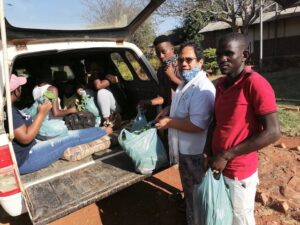
OLSH OUTREACH IN AFRICA
OLSH Sisters in Burkina Faso are responsible for the running of the Jules Chevalier School in the town of Zagtouli, where 198 students currently attend the pre-school, and 321 students are enrolled in the primary school.
Over 500 children are provided with one main meal and two nutritious snacks every day – a lifeline to children coming from backgrounds where poverty is rife and diet is poor, who are in real need of sustenance and good nutrition.
The OLSH community in Burkina Faso are working to raise
€19,465 to install a solar energy system in the school,
and to renovate a large area of the school to create a safe learning area for students.
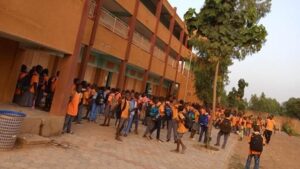
The Bakhita Village Outreach Project is run by OLSH Sisters in Dwars River. This programme allows for OLSH Sisters to visit vulnerable girls in their villages twice weekly, ensuring their safety and healthy development, teaching basic life skills, and keeping up with their educational progress, including school attendance, homework, and general behaviour. The carers also deliver food parcels, toiletries, and clothing.
The Bakhita Village Sisters need €10,000 to cover daily costs,
allowing them to continue to support and encourage young girls.
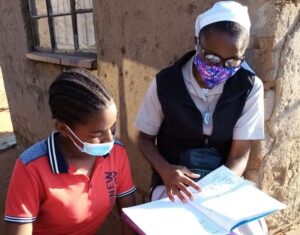
The Irish Province of the Missionaries of the Sacred Heart has a long-standing friendship with the Holy Family Care Centre in Ofcolaco, a residential home that cares for children up to the age of 18, who suffer with life-threatening illnesses and have often been orphaned or abandoned.
The care centre is home to 75 children, from newborns to teenagers. Sr Sally Duigan, OLSH Regional Leader and community leader at Holy Family, is currently raising funds to help with the daily costs of running the centre.
€10,000 will be allocated to vital health care for seriously ill children, essential educational supplies,
and outreach programmes for children who are being reunited with their families.
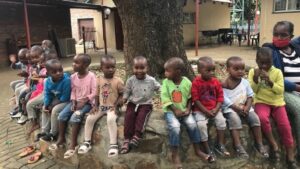
The OLSH South Africa Outreach Programme cares for 150 families in Nzhelele, including children living with HIV/AIDS, and families who have suffered bereavements or abandonments, and are run by grandmothers or older children.
The Nzehele Outreach Team are working to raise €10,000 to establish a vegetable garden project,
which will contribute to the nutritional needs of children living with HIV/AIDS,
while teaching valuable skills and promoting self-sufficiency.
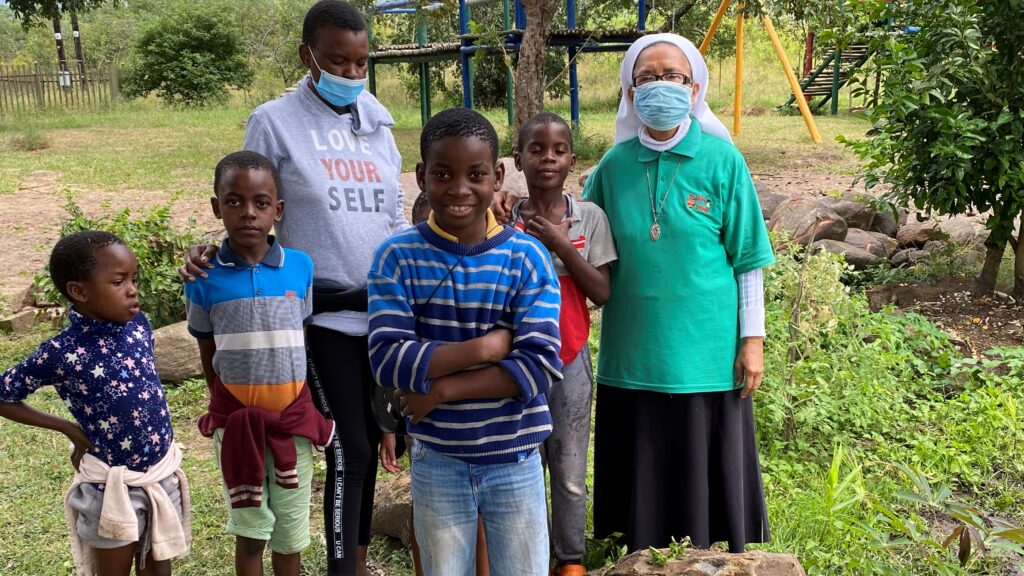
RENOVATING A MATERNITY WARD IN THE DEMOCRATIC REPUBLIC OF CONGO
The Jules Chevalier Health Centre was established by the OLSH community in Mbandaka, in Democratic Republic of Congo, 10 years ago, and serves as a maternity clinic for local women in the extended area. Many of the women who use the health centre live across the Congo River, and even making the journey can in itself prove hugely difficult.
Currently, whenever it rains, a significant amount of water gets into the maternity ward at the centre, making conditions extremely uncomfortable and unsanitary for women in varying stages of pre- and post-natal care.
Renovations to stop the leaks will cost a total of €9,887.
Can you help?
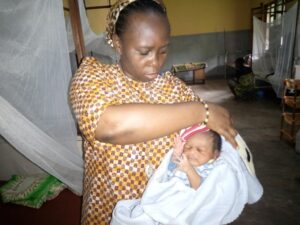
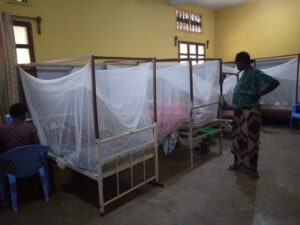
PLEASE SUPPORT OUR OLSH SISTERS IN THEIR GLOBAL OUTREACH
Fr Alan in South Sudan: Christmas in South Sudan
“It’s a big shift coming back to South Sudan again. After a few weeks at home in November, sporting a woolly hat, gloves, and my scarf, I’m now back in my shorts and light shirts. All this week the temperature is around the 38C mark, and it isn’t even the hottest time of the year! Still, it’s good to be in Loreto again.
The exams are over and the term has come to an end, so most of the students headed off for the holidays. We only have a small group who either live far away or would be in danger of forced marriage if they went home. It’s quieter around the campus, but there is always something happening. We have already gone on a few day trips to nearby parishes. The rains finished earlier than last year, so the roads are passable, but very dusty. So far, we have taken the students to the parish of Cueibet, which is under the care of Korean, Peruvian, and Egyptian missionaries, and Wulu, where a Spiritan missionary is parish priest. In each place the Church is actively involved in the local community, supporting education through schools, running agricultural projects, working in the hospitals, and of course celebrating the Sacraments with the people.
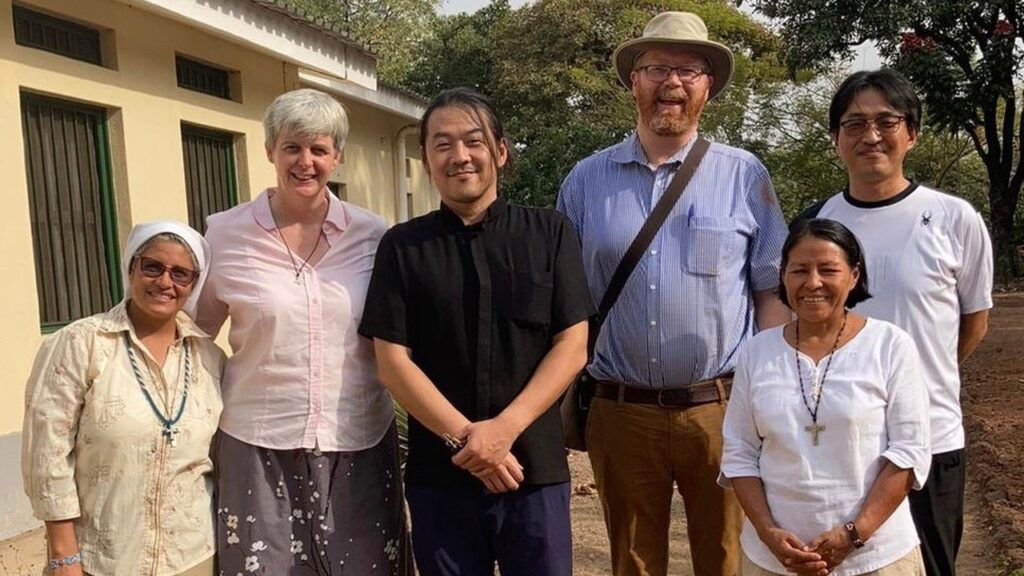
Christmas Mass for us would normally happen in our usual spot under the neem trees next to the school, but one of the priests in town who was at home for holidays was diagnosed with COVID, so we agreed to help out in his parish. Our Christmas vigil and morning Mass were both special celebrations, with families gathering together to welcome the birth of Jesus once again. As Pope Francis said this year, “Jesus is the name and the face of love – this is the foundation of our joy”. There was no shortage of joy as the people sang, danced, and prayed in thanksgiving for the birth of our Saviour.
Our own Christmas dinner was a wonderful affair. Like any family we set out the extra tables and twenty-two of us shared a dinner of goat, sikumawiki (sort of like spinach, but not really), chapati, Irish potatoes (that’s what the locals call them), and tamalaka (a peanut sauce), all made by the students. Nothing is wasted when cooking here. I still haven’t worked my way up to tripe yet. One day maybe, but not this year!
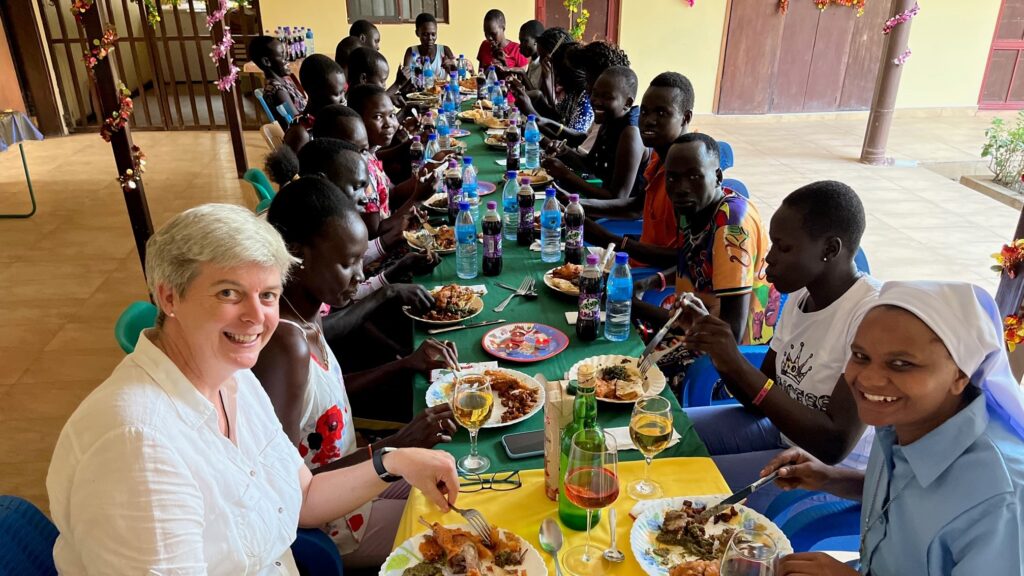
The Feast of the Holy Family fell on the 26th, and according to tradition here, that is the main day to baptise children. Normally, four baptisms at any liturgy is more than enough for me, but here we had twenty-two. It was chaotic as you might expect at times, but it was a holy chaos, and the babies were just beautiful. People here cannot afford mobile phones, so cameras going off non-stop was not an issue. The baptisms took place within Mass, so the whole affair took two hours. By the end, I was ready for a cuppa, but the babies were probably the quietest there, content in their mothers’ arms. Another unique tradition they have there is to place a tinsel garland on the priest mid-baptism, so while I was busy anointing, I was being festooned like the prize bull at a cattle show.
!["[One] unique tradition they have there is to place a tinsel garland on the priest mid-baptism, so while I was busy anointing, I was being festooned like the prize bull at a cattle show." ~ Fr Alan recalls baptising twenty-two babies, in keeping with local tradition, on the Feast of the Holy Family on December 26th. "[One] unique tradition they have there is to place a tinsel garland on the priest mid-baptism, so while I was busy anointing, I was being festooned like the prize bull at a cattle show." ~ Fr Alan recalls baptising twenty-two babies, in keeping with local tradition, on the Feast of the Holy Family on December 26th.](https://www.mscmissions.ie/wp-content/uploads/2022/01/FrAlan_December2021_2-Copy-1024x577.jpg)
As I write this on New Year’s Eve, I look forward to tonight, when we will have a New Year vigil for the Feast of Mary, Mother of God. Previously, people would be wary of being out after dark, because of persistent security problems. Thankfully, this year things are calm and people feel safer. 2021 has certainly been a year of mixed blessings, with more than its fair share of challenges. I think we have all felt a little bit more vulnerable, but perhaps more connected too in spite of our self-isolation. There is no doubt we realise that we are more reliant on each other, and we are conscious that the effects of how we live can impact our brothers and sisters.
This year South Sudan benefitted from global solidarity efforts like the Covax vaccination programme. Loreto as a school has gone from strength to strength. A lot has been achieved, but there is still so much more to do. We have also been impacted by climate change, as rainfalls, which are essential to survival in an agricultural country, are disrupted. People will have to make do with what they harvested and we’ll do our part to help too. As we begin this New Year, let us do so with joy and with hope as well. We remember that God came into our world as a vulnerable child, in the simplest of settings, among a people who were struggling, to remind us He came for all of us and that together we are one family.”
Merry Christmas to you all or as they say here, Miet puou dhith banyda.
Fr Alan
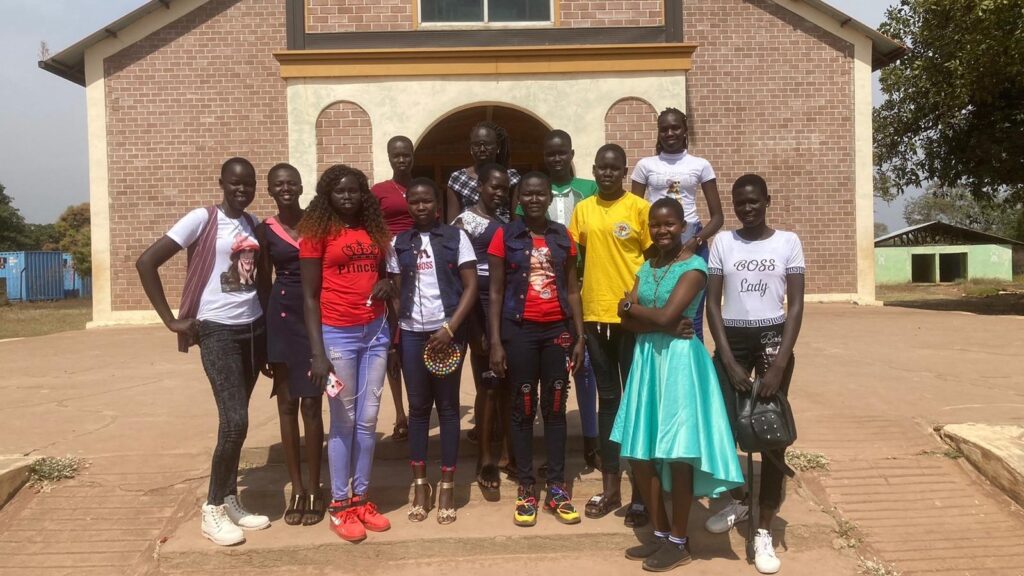
Read more from Fr Alan’s missionary journey in South Sudan:
- Looking for a Sign on the Way to South Sudan
- Building a Better Future in South Sudan
- Christmas Greetings from Fr Alan in South Sudan
- A Cup of Sugar and Maybe a Goat
- Mock Exams and Real Life in South Sudan
- As Easy as Baking a Cake
- Holy Week on the Move
- Three Arrivals and a Party
- Celebrating the Missionary Life
- Seeds of Hope
- Young People Fighting COVID-19 in Rumbek
- Ticket to Ride
- Lions, Snakes, and the World’s Deadliest Predator
- Vaccine Status: Denied
